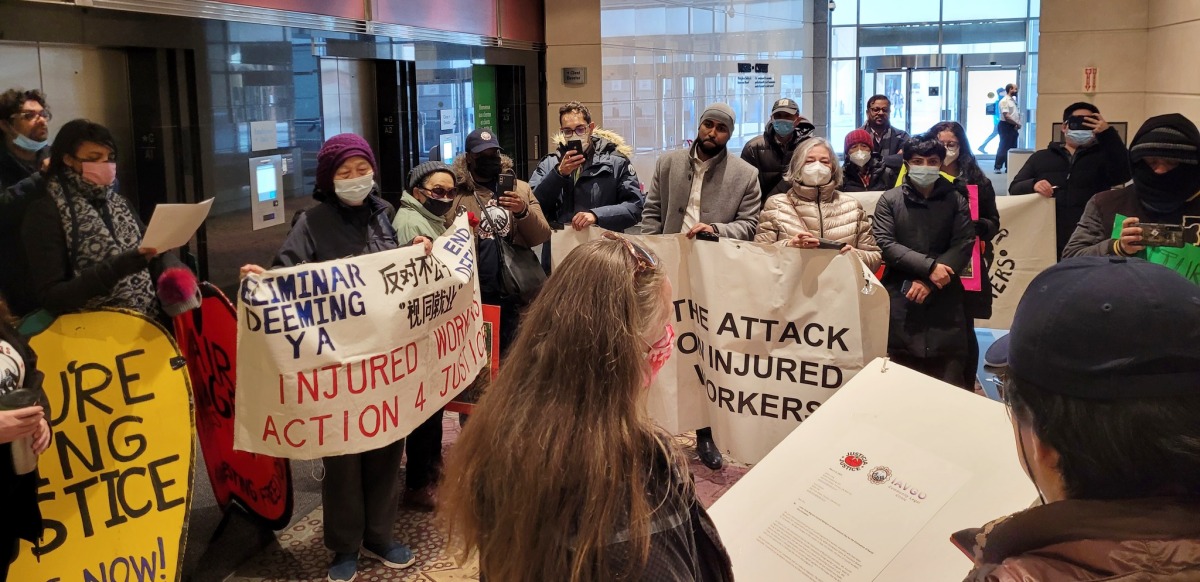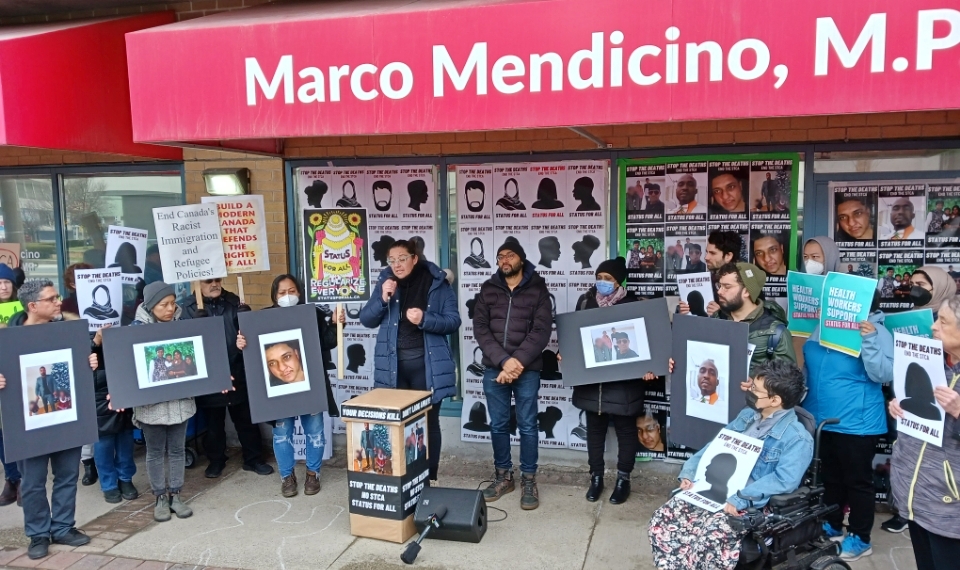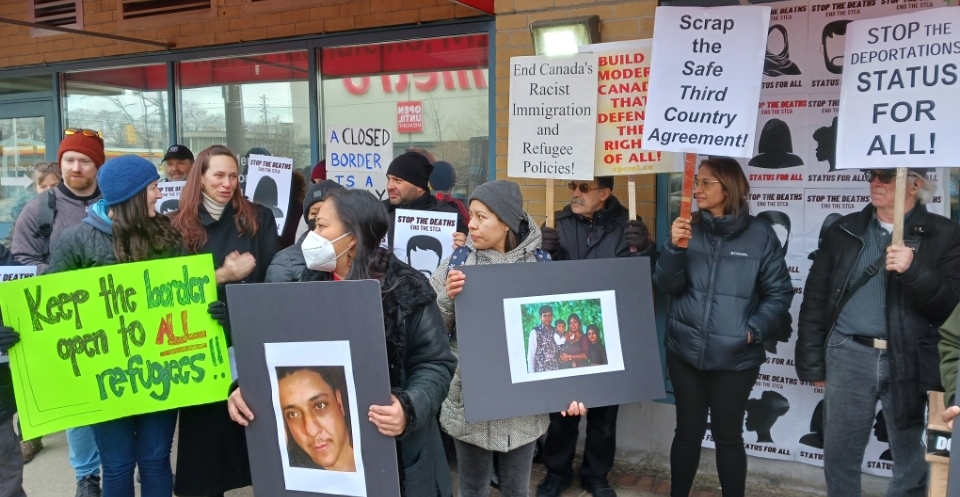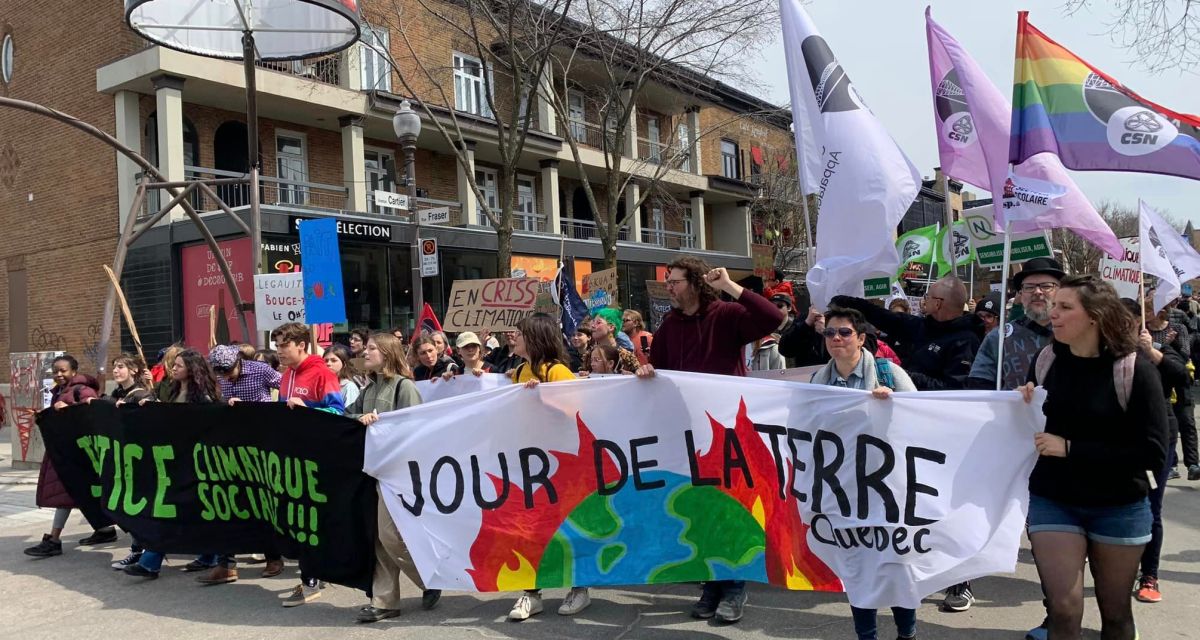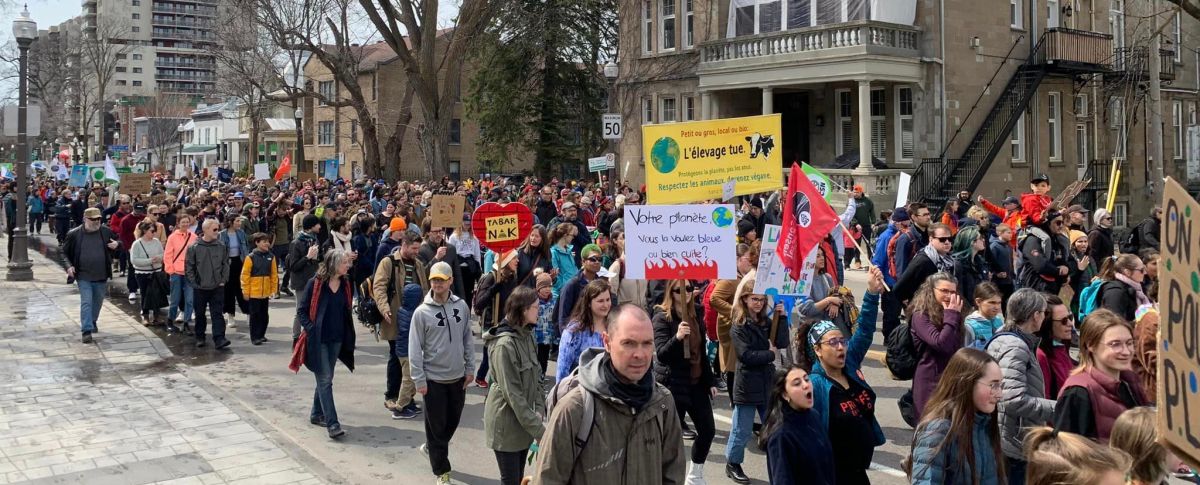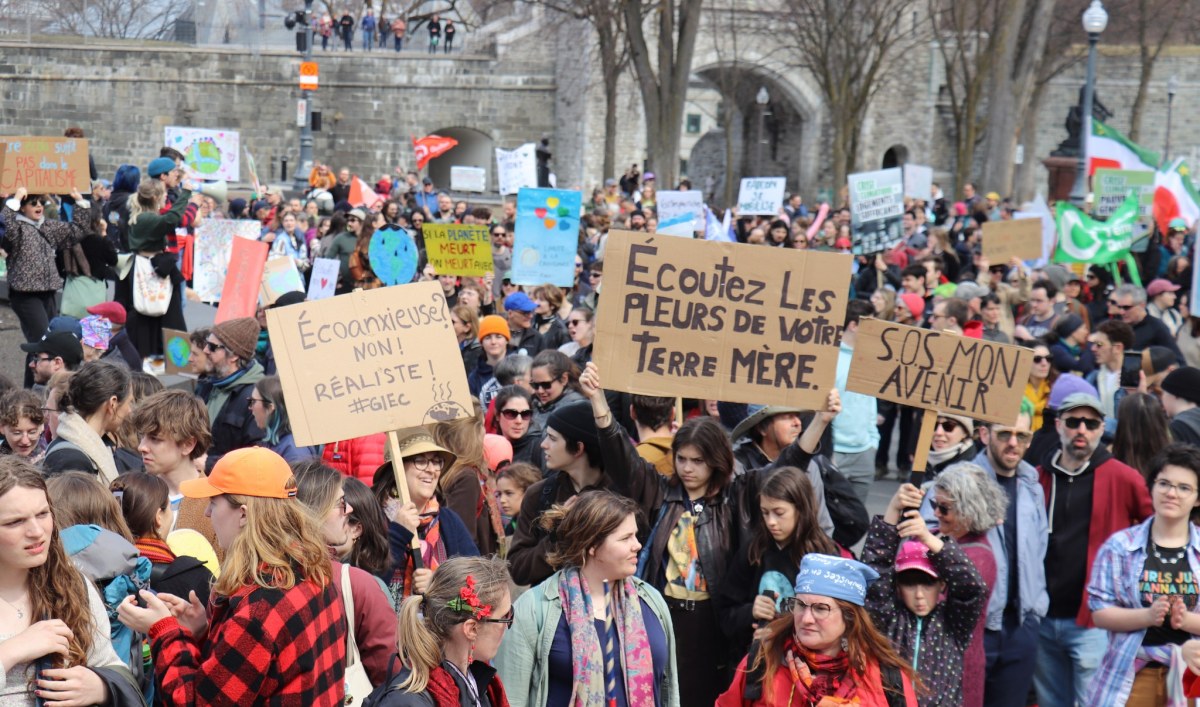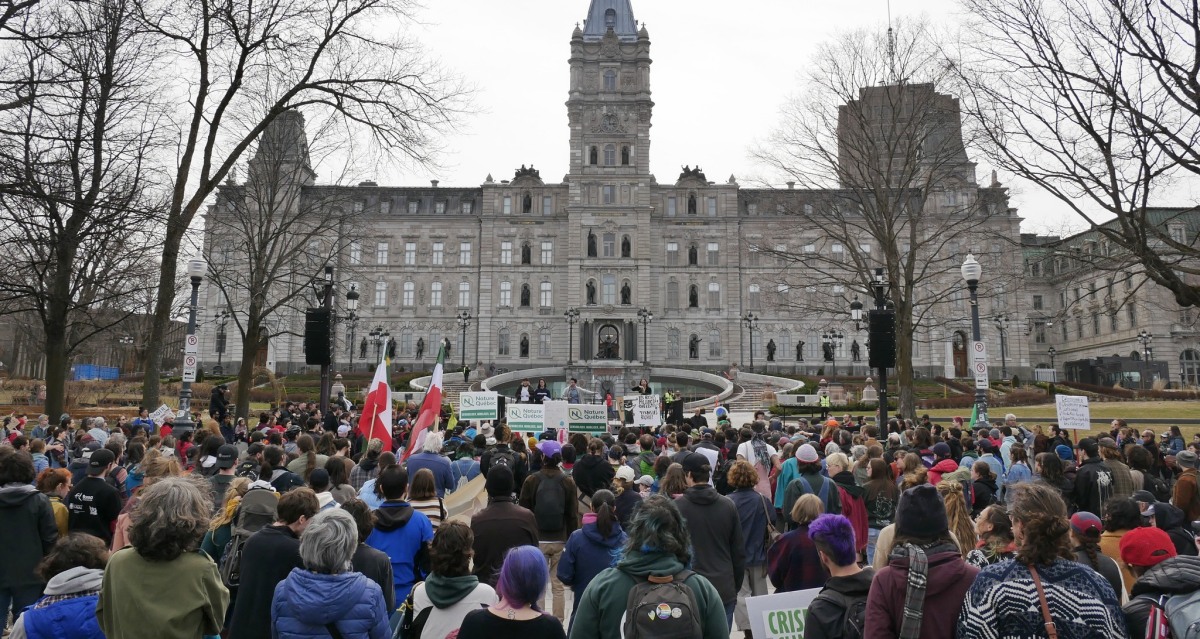No. 5
May 2023
Anarchy Raised to Authority
• Greater Accumulation of Social Wealth in Very Few Hands
• Speculation on Global Food Prices
Canada Needs a Foreign Policy that Serves Peace, Not U.S. Hegemony
• Canada Steps Up
Interference on Korean Peninsula
in the Name of
Partnership and Cooperation
• Canadian Intervention Props Up Haitian Police
• Canada Isolated
in Security Council Debate on
Effective
Multilateralism
Alberta General Election to Be Held May 29
• Working People
Faced with Need to Take Control of the
Decision-Making Process
Compensation for Egregious Harms Experienced by First Nations Children
• Revised Final Settlement Agreement
News and Views on Matters of Concern
• Demands for Canadian Workers to Submit to U.S. War Economy
Mourn Our Dead! Fight for the Living!
• Suncor Workers
Raise Need to Exercise Control
Over Working Conditions
• Migrant Workers Demand Accountability
• Ensuring Health and Safety of Migrant Workers
• Workers Continue
to Fight for Health and Safety Rights
and Compensation
Canadians and Quebeckers in Action for the Rights of All
• Action in
Toronto Calls for Scrapping of Safe
Third Country Agreement
• Thousands Take to Quebec Streets in Defence of Mother Earth
• Militant Support for Palestinian People's Right to Be
Responses to Alarming U.S. Deployments in the Asia Pacific
• U.S. Deploys Nuclear Weapons on Korean Peninsula
• Democratic
People's Republic of Korea Successfully
Tests Ballistic
Missile
• National
Democratic Front of the Philippines
Celebrates 50th Anniversary
Anarchy Raised to Authority
Greater Accumulation of Social
Wealth
in Very Few Hands
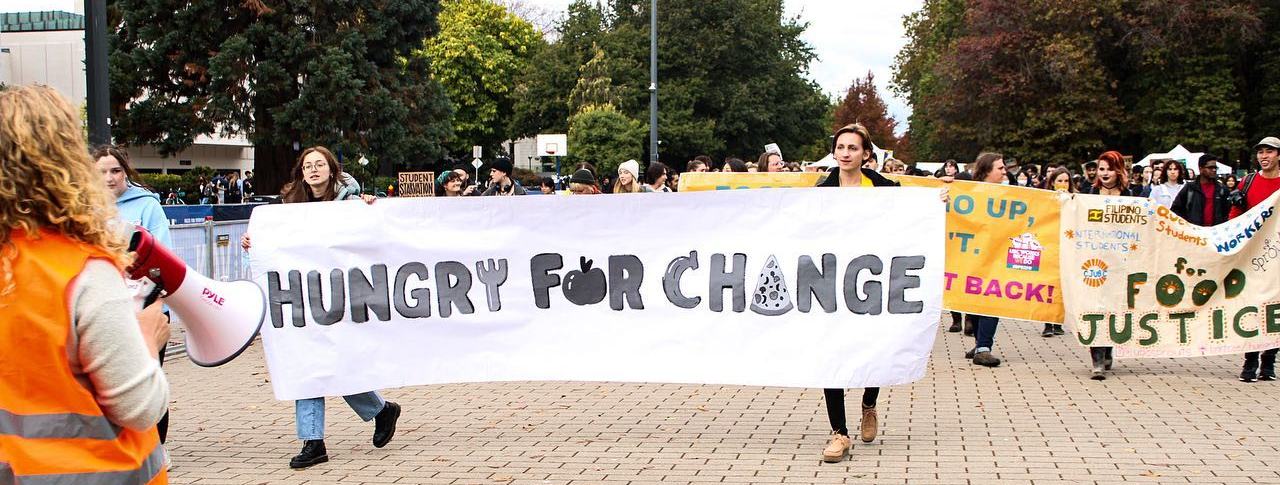
The civil society organization Oxfam reports that during the past two years, a tiny minority of oligarchs "amassed close to two-thirds of all new wealth created in the world." The "collective fortunes of the super-rich have been increasing by $2.7 billion a day," the study says, while working people are suffering lower wages, insecurity, wars and attacks on the social programs on which they depend.
Working people produced $42 trillion in new social wealth since 2020 with $26 trillion of that or 63 per cent expropriated by the super-rich who control the economies of the world. The remaining $16 trillion or 38 per cent was divided among the actual producers mainly for their daily necessities. "A billionaire gained roughly $1.7 million for every $1 of new global wealth earned by a person in the bottom 90 per cent," Oxfam says.
 Certain billionaires in control
of food and energy production and
distribution saw their wealth soar in 2022 as the prices people
had to
pay for social products in those sectors rapidly rose.
Ninety-five
privately-owned and controlled food and energy enterprises
concentrated
mainly in the U.S.
and Europe more than doubled the amount they expropriated as
private
profit from global production. The consequences of this
concentration
of increased wealth in the hands of a few were immediate,
causing 1.7
billion workers to face price inflation outpacing the wages they
receive from the sale of
their capacity to work to the very rich who own and control the
economy
and are profiting from this theft of social value. Tragically as
a
result of the gross inequality more than 820 million people --
roughly
one in ten people on Earth -- are going hungry, Oxfam reports.
Certain billionaires in control
of food and energy production and
distribution saw their wealth soar in 2022 as the prices people
had to
pay for social products in those sectors rapidly rose.
Ninety-five
privately-owned and controlled food and energy enterprises
concentrated
mainly in the U.S.
and Europe more than doubled the amount they expropriated as
private
profit from global production. The consequences of this
concentration
of increased wealth in the hands of a few were immediate,
causing 1.7
billion workers to face price inflation outpacing the wages they
receive from the sale of
their capacity to work to the very rich who own and control the
economy
and are profiting from this theft of social value. Tragically as
a
result of the gross inequality more than 820 million people --
roughly
one in ten people on Earth -- are going hungry, Oxfam reports.
"While ordinary people are making daily sacrifices on essentials like food, the super-rich have outdone even their wildest dreams. Just two years in, this decade is shaping up to be the best yet for billionaires -- a roaring '20s boom for the world's richest," said Gabriela Bucher, executive director of Oxfam International. The myths of trickle-down economics and a rising tide lifts all ships are shattered in the reality the people face. The tide, which has been more like a tsunami of enormous social wealth pouring into the pockets of the oligarchs during the anti-social offensive has only "risen the superyachts," Bucher concluded.
This report once again confirms that the minority who control the economy and politics throughout the world daily amass ever greater amounts of the social wealth the working people produce. The possession by a few of social wealth, investments and means of production and their control of governments lead to greater accumulation for the rich minority while working people suffer increasing insecurity and a lower standard of living, and social problems fester.
How can it be otherwise as long as a rich minority controls the economy and politics, and expropriate for themselves the added-value workers produce and refuse to recognize or accept that in the modern world the people themselves must be in control of all affairs that affect their lives? There is nothing new in that. The challenge facing the working class is to solve the problem of their own empowerment so that they cannot be reduced to a force which simply describes how corrupt, degenerate and superfluous the rich minority are, or, what is just as bad if not worse, demand that this superfluous force should solve the problem of the system from which they profit.
The accumulated social wealth of the rich allows the expropriators to use the power and control this brings to defend the status quo that favours them and not allow an advance to the next stage in human development. The working people themselves must take up the social responsibility to gain control over political affairs, the productive forces and the social wealth they produce so as to use it to humanize the social and natural environment.
The imperialist economy where the super-rich rule over the working people is transitory. It is necessary to advance to a new direction and stage under the control of the working people. This requires that the working people continuously and on all matters of concern establish their own vantage point, based on their own independent politics. The working people can fight the anti-social program by advancing their own pro-social program which lays their own claims on society. These are the claims they are entitled to make by virtue of the relations people enter into in the society and of the need to create a society which provides the rights all by virtue of being human with a guarantee. Working peoples’ independent actions with analysis on this basis are bringing the new quality into being of the workers speaking for themselves and representing themselves. This is crucial to avert the dangers which lie ahead as a result of inter-imperilaist competition and the war path the U.S./NATO alliance, including Canada, are pursuing.
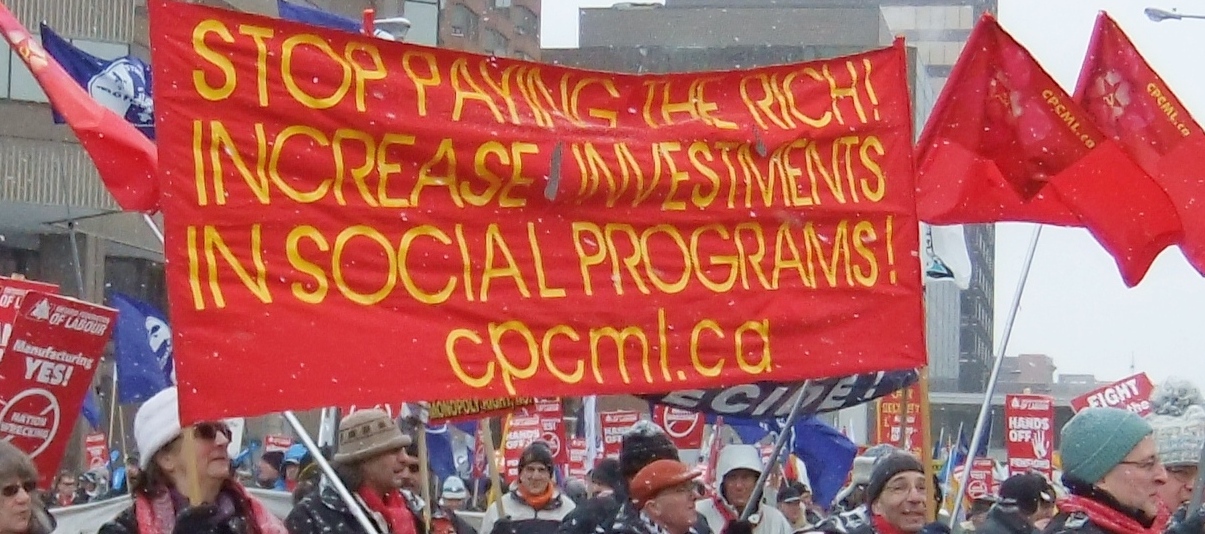
Speculation on Global Food Prices
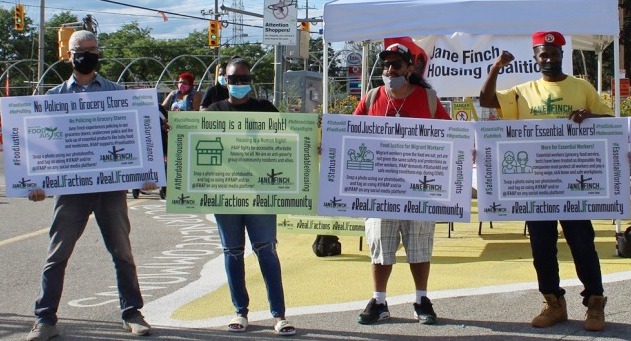 Action in Jane-Finch area of Toronto for
right to housing and food security, August 24, 2021
Action in Jane-Finch area of Toronto for
right to housing and food security, August 24, 2021
A joint investigation by Unearthed (a project of Greenpeace UK) and the website Lighthouse Reports found that 10 of the globe's largest oligopolies called hedge funds "bet on hunger" and made nearly $2 billion on the food-price spike following the pandemic and the outbreak of the U.S./NATO proxy war in Ukraine against Russia in February of 2022.
Commenting on the findings of the investigation, Olivier De Schutter, a UN Special Rapporteur on extreme poverty and human rights said, "Hedge funds helped inflate a price bubble, putting upward pressure on food prices [...] and this has affected hunger levels of the world's poorest people [...] Hedge funds and financial speculators have made obscene profits by betting on hunger and exacerbating it. That cannot be right."
The investigative report examined the returns made by Société Generale's SG Trend Index for the first quarter of 2022, both prior to the start of the proxy war in Ukraine and immediately after it. The analysis focused on grains and soya beans. Calculations from the report showed that "the hedge funds in question made $1.9 billion in returns on these commodities, a much higher figure than the returns on them in the first quarter of any of the previous five years. The prices of staple foods like wheat, as well as fertilizers rose sharply following the start of the military operation, propelled by soaring energy costs as the globe feared for the future of Russia's energy exports amid sanctions that followed the conflict."
Unearthed and Lighthouse Reports also found the extent to which food companies have profited from the crisis. The world's 20 largest food companies made $53.5 billion in additional profits in the last two years beyond what they "normally" expropriate, "first from rising food prices during the COVID-19 pandemic and then from last year's spike with the outbreak of the U.S./NATO proxy war against Russia."
While it is the stranglehold over world markets and distribution chains by oligopolies that is behind the rise in food prices, the blame for rising prices was first put on the COVID pandemic and now it is put on the U.S./NATO proxy war in Ukraine which imposes sanctions on Russia and has disrupted Russian exports to Europe. Davi Martins, a spokesperson for the report, gets closer to the truth of the matter when he says:
"What we are witnessing is an enormous transfer of wealth to a few rich families that basically own the global food system, at a time when the majority of the world population is struggling to make ends meet.
"[A] few rich families that basically own the global food system" form one or more oligopolies which operate as cartels and coalitions to control prices by colluding with each other, ultimately providing uncompetitive prices in the market. Loblaw, Sobeys and Metro make up more than half of all food retail sales in Canada. Factoring in Walmart and Costco, just five companies control three-quarters of grocery sales across the country.[1] They have caused food prices to increase at the fastest rate in 40 years, the CBC reported. It says that their "market concentration has come under intense scrutiny in recent months," and "All five companies have faced accusations of profiteering, with executives summoned to testify before a parliamentary hearing in Ottawa where they were grilled by MPs about higher grocery bills."
"The truth is we are at the end of a very long food supply chain that has economic inputs at every step and stage," Empire president and CEO Michael Medline told the committee in March. In other words, he denied the accusations of price fixing by saying their margins on food are low.
The federal competition watchdog has separately launched a study into grocery store competition in Canada, and will issue its report in June, the CBC reported.
Facts however are stubborn things. What is lacking is a political system which holds anti-social actors to account. In 2017, George Weston Ltd. and Loblaw Companies Ltd. revealed that both participated in an industry-wide bread price-fixing "arrangement" for over a decade.
"Canada's competition watchdog alleged in court documents in 2018 that at least $1.50 was artificially baked into the price of a loaf of bread during the 16-year price-fixing conspiracy involving the country's largest bakery wholesalers and grocery retailers. The Competition Bureau says its investigation into bread price-fixing is ongoing," the CBC reported.
A strategy retailers use to maximize their own profits is called "price discrimination" or the "two-price system" -- "a long-standing technique used by retailers and service providers to squeeze the most profit out of their customers by selling to different people at different prices" says Jean-Paul Lam, an associate professor of economics at the University of Waterloo in Waterloo, Ontario.
"The goal is to increase sales and profits," he said. "Retailers will charge customers the price they are willing to pay, allowing them to capture more of the consumer surplus, which is the difference between what a customer is willing to pay and what they actually pay," Lam explained in an email to CBC. "These retailers/producers can increase their profits and profit margins by capturing more consumer surplus," he stated.
An oligopoly exists when several companies or entities which represent narrow private interests exert significant control over a given market or sphere of interest. This includes steel manufacturers, oil companies, railroads, tire manufacturers, grocery store chains, wireless carriers, Big Pharma, construction and engineering companies and many more such as supranational consulting firms and banks. All of them operate as cartels and coalitions to control prices by colluding with each other ultimately providing uncompetitive prices in the market. They can act independently of specific governments or, most likely, usurp the decision-making power in this or that country to get tacit approval, funds, tariffs imposed which favour them, sanctions so as to profit from the results and so on.
The military-industrial-civil complex in the United States is also an oligopoly where all kinds of state actors operate in concert to achieve a specific result. So too NATO is an oligopoly which combines various branches of the economy and governments, national and international decision-making, international institutions, organizations and alliances to achieve definite results. The superpacs operate during U.S. elections to speculate on winners and losers. They act as cartels and coalitions to intervene in an election and influence the outcome in favour of their own private interests.
In the economic domain, one definition of oligopoly is "a market structure with a small number of firms, none of which can keep the others from having significant influence. The concentration ratio measures the market share of the largest firms." The pertinent dictionary says, "There is no precise upper limit to the number of firms in an oligopoly, but the number must be low enough that the actions of one firm significantly influence the others."
"Key Takeaways" provided by Investopedia are:
- The term "oligopoly" refers to a small number of producers working, either explicitly or tacitly, to restrict output and/or fix prices, in order to achieve above normal market returns.
- Economic, legal, and technological factors can contribute to the formation and maintenance, or dissolution, of oligopolies.
- The major difficulty that oligopolies face is the prisoner's dilemma that each member faces, which encourages each member to cheat.
- Government policy can discourage or encourage oligopolistic behavior, and firms in mixed economies often seek government blessing for ways to limit competition.
Firms in an oligopoly set prices, whether collectively -- in a cartel -- or under the leadership of one firm, rather than taking prices from the market. Profit margins are thus higher than they would be in a more competitive market.
In the economic field, these oligopolies represent pooled private wealth that can exercise control over certain sectors or aspects of the economy. They now dominate the imperialist economy. They take over decision-making of compliant governments and use the prerogative police powers of executives and the courts to do as they wish. A harmful example of this today is how they keep prices high in the supermarkets. For instance, the Weston family is described as a prominent family of business people of Canadian-origin with global interests primarily in food and clothing ventures. Founded by George Weston in 1882, the company today consists of the Choice Properties real estate investment trust and Loblaw Companies Limited, Canada's largest supermarket retailer, in which the family maintains a controlling interest. Retail brands include President's Choice, No Name and Joe Fresh. Forbes Magazine (June 2019) listed CEO Galen Weston and his family, with an estimated net worth of USD$8.7 billion, as the third wealthiest in Canada and 178th in the world.
Examples of this damaging control abound throughout the economy. Many oligopolies are organized as so-called holding companies, which operate similar to banks except their creditors are restricted to people with extreme wealth. They pool together social wealth that workers have produced and use it to buy and sell whatever is available. Today, more often than not, they trade fictitious commodities called derivatives. The oligopolies can also be identified as financial institutions, hedge, mutual and pension funds, and even philanthropic organizations such as the Ford Foundation. They use the power of their massive holdings to overwhelm existing enterprises and sectors to bring them under their control. From this position and aided by their usurpation of the decision-making powers of compliant governments, they manipulate prices and attack the working class with demands for concessions to increase the value they expropriate and make their owners even richer. Oligopolies are symptomatic of the parasitism and decay of the imperialist system, which is corrupt, moribund and a heavy burden on the peoples of the world and Mother Earth.
Stone Canyon Industries Holdings Inc. centred in California is one such oligopoly that has "cornered" salt production and distribution in the Americas. Backed by compliant governments and courts, it is waging a dirty war against striking salt workers in Windsor, Ontario to enforce conditions which seek to reduce the workers to an unorganized force which cannot defend its claims on the wealth it produces.[2]
Note
1. Who's Who 2022 report by industry trade magazine Canadian Grocer.
2. For reference see: Workers' Forum, March 6, 2023, No. 10; Workers' Forum, March 17, 2023, No. 14; Workers' Forum, March 23, 2023, No. 15; Workers' Forum, April 13, 2023, No. 20.
Collapse of Credit Suisse
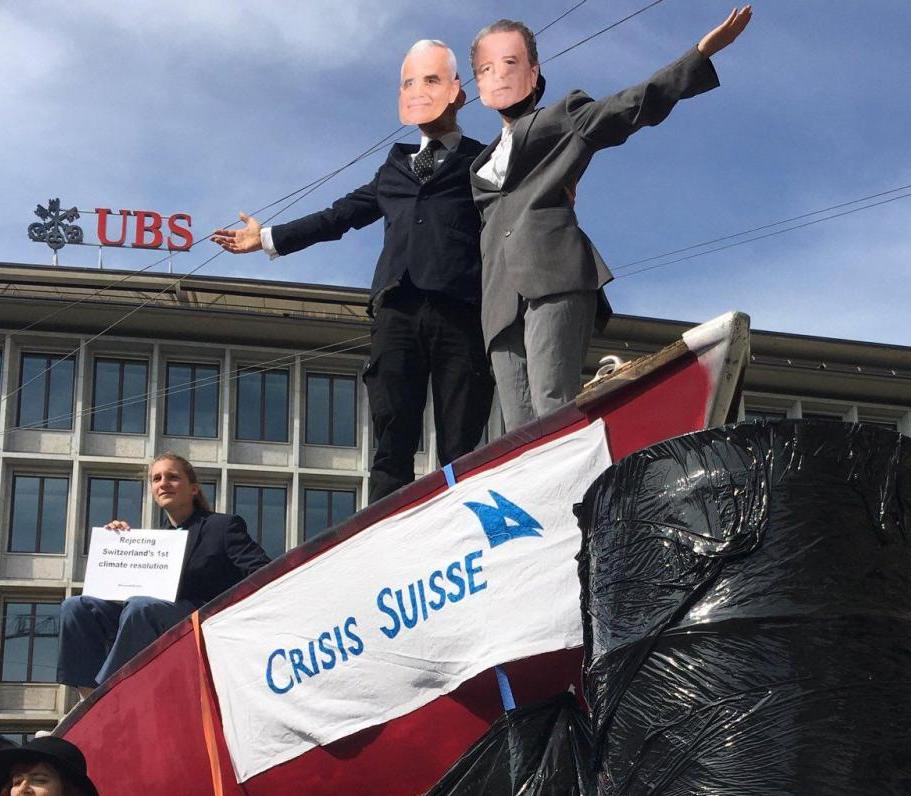
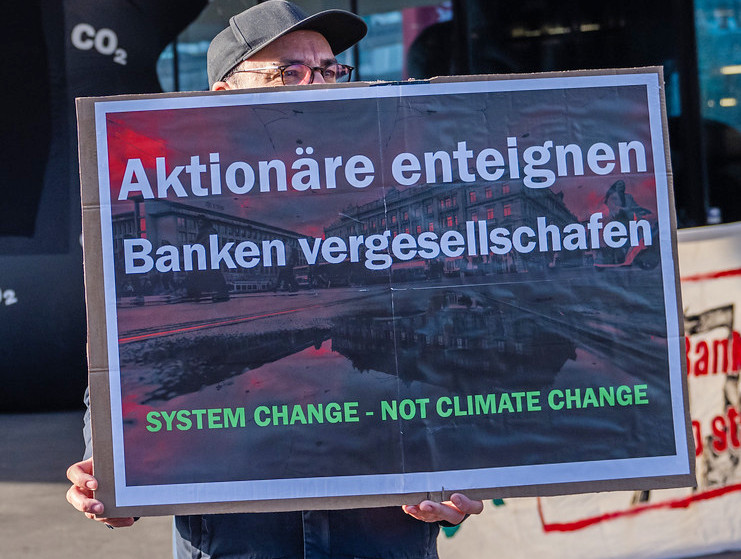
Protests
by Swiss climate activists against government's bailing out
of
Credit Suisse on March 20, 2023 (left) and April 4, 2023.
Credit Suisse is a supranational oligopoly and the second largest financial institution in Switzerland. Known colloquially as a holding company, the bank is headquartered in Zurich with assets and dealings in over 150 locations with around 70 per cent of its 50,000 workers spread out in 50 countries managing $1.75 trillion in assets as of the end of 2021.
The oligopoly spiraled downward into crisis this year following several years of large losses. In 2021, its U.S. investment fund Archegos Capital along with the now insolvent Greensill Capital in Britain triggered losses of billions of dollars. Meanwhile additional troubles were underway in its U.S. investment arm called First Boston. Subsequently, Credit Suisse's stock market share value plummeted by three-quarters. Lacking funds to service its debts, the bank announced plans early this year to borrow an additional $54 billion. The cumulative effect of these moves prompted account holders to pull out $119 billion from the bank.
Financial media say many of the bank's dealings involve derivative contracts using borrowed fictitious value that shuffles money from one hand to another without any connection to social production. This practice began in earnest with Credit Suisse's acquisition of First Boston in 1988, signalling the de facto elimination of any regulation that prohibited banks from doing so in the United States. With price inflation and the rise in interest rates in 2022, many of its derivative contracts and bond holdings lost much of their notional value forcing the bank to report a net loss of 7.3 billion francs (nearly $8 billion) in 2022 and a warning that 2023 would bring another "substantial" loss.
Faced with these losses and lacking funds, the bank sought help from its largest shareholders in the U.S., France and Saudi Arabia who all refused to invest more money. The ruling elite in Switzerland sounded the alarm. Under the rubric that Credit Suisse is too big to fail, the executives of the bank and government invoked an emergency order to force liquidation of some of the bank's assets while preserving the assets of its most powerful creditors and a takeover by UBS, the largest financial institution in Switzerland. The executive decree bypassed Credit Suisse shareholders, who would otherwise have had voting rights, and the non-executive members of the Swiss Federal Assembly, both its National Council and Council of States.
The executive order prompted Dominik Gross of the Swiss Alliance of Development Organisations to say, "The government's use of emergency powers to push this deal through goes beyond legal and democratic norms."
The Communist Party of Switzerland in a similar statement says, "The Communist Party also deplores yet another abuse of the right of necessity to bypass the democratic consultation process of the Swiss Parliament, which has already happened with the pandemic and the sanctions. The problems of Credit Suisse have been known for several months, but the Parliament has not been consulted on the instruments and strategies for a possible exit from the crisis."
Dominik Gross also denounced the bailout aspects of the deal, which at first glance appear to favour certain owners of the bank's assets and UBS, which itself is on the verge of crisis. In a Bloomberg News item called "Bank bailout could cost Swiss taxpayers billions," Gross says, "Swiss taxpayers too are on the hook for billions of francs of junk investments and yet the government, FINMA [Swiss Financial Market Supervisory Authority], and the central bank have given little explanation about the state's 9 billion loss guarantee to UBS."
 Details
of the bailout are scarce apart from a government guarantee of
$109
billion in "liquidity assistance" for UBS from Switzerland's
central
bank and the 9 billion francs loss guarantee. The government
decreed a
write-down of certain Credit Suisse bonds outside of any
bankruptcy
process,
which has unleashed a flood of legal actions opposing the
decree.
Credit Suisse shareholders will receive a percentage of $3.24
billion
in UBS stock market shares while UBS will take over the $1.75
trillion
in Credit Suisse's managed assets, greatly increasing the almost
$4
trillion UBS already
manages. Even before this infusion of assets, UBS is said to
manage the
largest amount of private wealth in the world, counting
approximately
half the world's billionaires among its clients.
Details
of the bailout are scarce apart from a government guarantee of
$109
billion in "liquidity assistance" for UBS from Switzerland's
central
bank and the 9 billion francs loss guarantee. The government
decreed a
write-down of certain Credit Suisse bonds outside of any
bankruptcy
process,
which has unleashed a flood of legal actions opposing the
decree.
Credit Suisse shareholders will receive a percentage of $3.24
billion
in UBS stock market shares while UBS will take over the $1.75
trillion
in Credit Suisse's managed assets, greatly increasing the almost
$4
trillion UBS already
manages. Even before this infusion of assets, UBS is said to
manage the
largest amount of private wealth in the world, counting
approximately
half the world's billionaires among its clients.
Following the takeover, UBS announced significant layoffs of workers. Citing a senior manager at UBS, the Swiss newspaper Sonntagszeitung says 36,000 employees globally from the combined companies will be fired. Of those workers to be dismissed, 11,000 are in Switzerland. The two global oligopolies together employed 125,000 people worldwide at the end of 2022, with about 30 per cent in Switzerland.
In an earlier twist in this saga, during the 2008 economic crisis the Swiss National Bank (central bank) bailed out UBS by purchasing $60 billion of its toxic assets and $5.3 billion in shares of stock as an infusion of value to calm nervous creditors who were threatening to pull out their money.
Behaviour and Social Conditions
It is not
the consciousness of humans that determines their
being, but, on the contrary,
their social being that determines their
consciousness.
It is often suggested that bad or irresponsible policies are giving rise to the recurring financial crises and economic crises. Government bailouts using public money to save the institutions is also called bad policy because there is no compensation for the public, either financial (to be reinvested for the benefit of the society), or in terms of employment in guarantee of employment positions.
The cartel parties are particularly adept at reducing the entire thing to bad policies despite the fact that no matter which government is in power, the pay-the-rich practices prevail. The political economy of the imperialist system itself is not analyzed to find its internal contradictions that lead to recurring crises. Nor is the state structure examined and exposed as blocking the working class from imposing its control over what belongs to it by right, upholding the rights of all and bringing the outmoded relations of production into conformity with the socialized productive forces.
The fact is that anarchy has been raised to authority with devastating consequences. The prerogative powers of the executive of the Swiss state have been used to favour narrow private interests as is being done in the U.S., France, Canada, Germany, Britain and other countries. At the core of the neo-liberal restructuring of the state is the politicization of narrow private interests. In other words, the state is now not just in the service of narrow private interests but is actually run by these interests directly. It reveals the need to have the producers control the direction of the economy because the ruling elites are amassing great wealth at the expense of bringing the world to the brink of disaster.
The anti-social offensive, in particular the pay-the-rich schemes, destruction of social programs and use of police powers accelerated following the 2008 economic crisis with ever-darkening clouds of greater wars and economic and political collapse threatening the existence of humankind and Mother Earth. The behaviour and aim of the ruling elite reflect the material conditions in which they exercise their rule and expropriate the value the working people produce.
The modern working class is unlike any previous oppressed class. To gain relief from its oppression under imperialism it must create new economic, political and social forms that do not depend on or seek to exploit other human beings. These forms will provide the material basis to guarantee the rights of all.
In the Preface to a Contribution to the Critique of Political Economy, Karl Marx pointed out:
"In the social production of their life, humans enter into definite relations that are indispensable and independent of their will, relations of production which correspond to a definite stage of development of their material productive forces. The sum total of these relations of production constitutes the economic structure of society, the real foundation, on which rises a legal and political superstructure and to which correspond definite forms of social consciousness.
"The mode of production of material life conditions the social, political and intellectual life process in general. It is not the consciousness of humans that determines their being, but, on the contrary, their social being that determines their consciousness.
"At a certain stage of their development, the material productive forces of society come in conflict with the existing relations of production, or -- what is but a legal expression for the same thing -- with the property relations within which they have been at work hitherto. From forms of development of the productive forces these relations turn into their fetters.
"Then
begins an epoch of social revolution. With the change of the
economic
foundation the entire immense superstructure is more or less
rapidly
transformed. In considering such transformations a distinction
should
always be made between the material transformation of the
economic
conditions of
production, which can be determined with the precision of
natural
science, and the legal, political, religious, aesthetic or
philosophic
-- in short, ideological forms in which humans become conscious
of this
conflict and fight it out. Just as our opinion of individuals is
not
based on what
they think of themselves, so can we not judge of such a period
of
transformation by its own consciousness; on the contrary, this
consciousness must be explained rather from the contradictions
of
material life, from the existing conflict between the social
productive
forces and the relations of
production."
The working class must provide a new direction for the economy and empower itself so as to deprive the oligopolies, which operate as cartels and coalitions, of the decision-making power and their ability to act with impunity. This is what the struggles of the working people in the moribund capitalist societies are striving to achieve.
Canada Needs a Foreign Policy that Serves Peace, Not U.S. Hegemony
Canada Steps Up Interference on Korean Peninsula in the Name of Partnership and Cooperation
From April 13 to 15, Canada's Foreign Minister Mélanie Joly visited the Republic of Korea (ROK). The Global Affairs' press release about the visit noted that this is the 60th anniversary of diplomatic relations between Canada and the ROK and gave its purported aim as "reaffirm[ing] their strong and historic relations and steadfast friendship. The two countries also commit to supporting the rules-based international order and realizing the full potential of their relationship."
In fact, Canada has a long history of interference on the Korean Peninsula going back more than 70 years, in the service of U.S. imperialist aggression against the Korean people to block their unity and independence, starting with its participation in the Korean War from 1950 to 1953. The ROK itself would not exist except for the division of Korea at the end of World War II by the U.S. and the propping up of their puppet government in the south. Thus, the "historic relations" and "friendship" that Canada claims to have with the ROK are built on this foundation of crimes against the Korean people.
Today, Canada is part of an illegal naval blockade against the Democratic People's Republic of Korea (DPRK), while collaborating with the government of the ROK in the service of U.S.-led war preparations in Asia, aimed at the DPRK and China. The ROK is itself being brought together with a remilitarizing Japan to form a NATO-like military alliance under the U.S.
The meeting between Minister Joly and her Korean counterpart Minister Park Jin thus further embroiled Canada in meddling and warmongering around the Korean Peninsula, namely "an expanded partnership in defence and security" and "the launch toward negotiations on a General Security of Information Agreement [that] will contribute to deepening Canada's security cooperation with Korea and will increase information sharing and defence collaboration."
The press release goes on to talk about both countries' Indo-Pacific strategies, a euphemism for taking up hostile relations with China without openly saying so, but instead speaking about how the two countries will "counter threats to the rules-based international order, to address regional and global challenges, and to strengthen peace, prosperity, resilience and sustainability in the region."
In a meeting with Cho Tae-yong, the ROK's National Security Advisor, both Cho and Joly spread the usual disinformation about missile launches by the DPRK as a threat to regional peace, to cover up the ongoing nuclear threats and war exercises by the U.S. targeting the DPRK, and the refusal of the U.S. to sign a peace treaty with the latter to formally end the Korean War. Joly used the occasion instead to announce that Canada is extending its role in the naval blockade of the DPRK, called Operation Neon, until April 2026.
Canada's nefarious aims in Korea were underscored by Joly's visit to the War Memorial of Korea, where, Global Affairs explained, "[S]he highlighted Canada's enduring contribution to peace and security on the Korean Peninsula and paid tribute to the ultimate sacrifice of those Canadian soldiers who defended peace and freedom during the Korean War." Whether Minister Joly spoke out of ignorance or ill-intent does not matter. The peoples of the world, including Canadians and Quebeckers do not view imperialist war according to this inhuman method of accounting. Former U.S. Secretary of State Madeleine Albright infamously said that 500,000 deaths of Iraqi children due to U.S. war and sanctions were "worth it." Canada has never made amends for its contributions to the brutal crimes committed during the war, including the deaths of four million Koreans and the use of biological warfare. Such facts do not even merit a mention by Minister Joly. Are Canadians and Quebeckers to conclude that the killings of four million Koreans by the U.S., Canada and others were "worth it" to keep Korea divided and under constant threat by U.S. aggression?
Minister Joly's visit to the ROK underscores the need for Canadians and Quebeckers to get Canada out of the U.S. war machine in all of its manifestations -- whether they be NATO, NORAD or bogus partnerships with the ROK -- that do not represent their striving for relations of peace and friendship with all the peoples of the world.
Canadian Intervention Props Up Haitian Police
On March 29, the Canadian Embassy in Haiti signed a memorandum of understanding with Haiti's Ministry of Planning and External Cooperation and its Ministry of Justice and Public Security on the project to support the strengthening of the National Police Academy. The announcement from Haiti's Ministry of Planning shows the form Canada has decided to take to intervene in that country.
The signing of the memorandum of understanding came a few days after U.S. President Joe Biden's visit to Canada on March 23 and 24. On March 30, Prime Minister Trudeau announced the allocation of $100 million to support and train Haitian "security services" rather than lead an international force of several thousand members to Haiti, as requested by the United States.
The Royal Canadian Mounted Police (RCMP) have been training the Haitian police since 2009. Some of the police who carried out training in the past have themselves formed or joined private security companies which are linked with the street gangs said to be carrying out the violence in Haiti. This violence is the pretext for intervening in Haiti when it is all foreign generated. The RCMP has been denounced for its violence in Canada, for engaging in racial profiling, and for criminalizing those who fight for their rights. Canadians cannot expect them to act differently in Haiti.
No to Canada's intervention in Haiti, approved by the illegitimate government of Ariel Henry. This is what Canada's "rules-based" democracy looks like.
Canada Isolated in Security Council Debate on Effective Multilateralism
Under the chairmanship of the Russian Federation, the 9,308th session of the UN Security Council was held on April 24 with an agenda on the theme "Maintenance of International Peace and Security; Effective Multilateralism Through the Defence of the Principles of the Charter of the United Nations." The main feature which stood out in this UNSC debate was the active role played by many UN member states fighting to uphold and modernize the principles embodied in the UN Charter. Canada, on the other hand, put on a pathetic infantile performance by repeating worn out false ideological beliefs (FIBs) and not even remotely addressing the concrete reality facing the United Nations and the world.
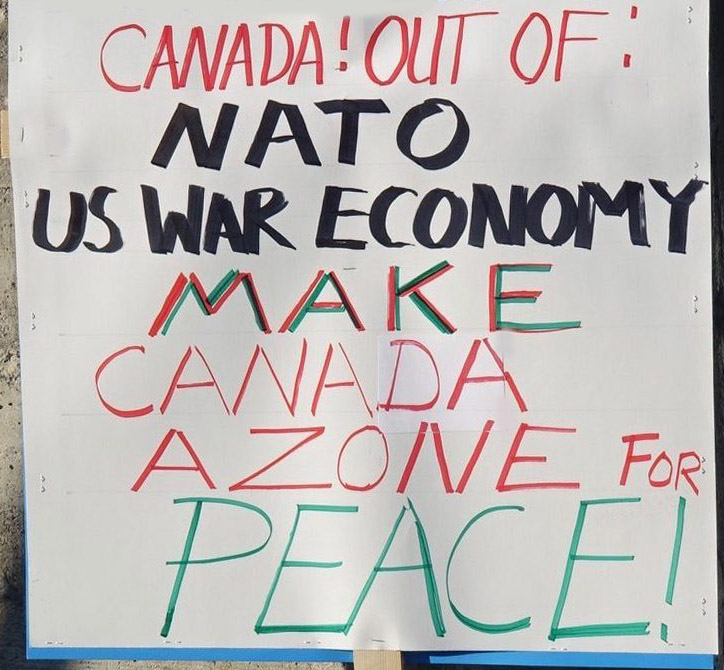 Canada's Ambassador Bob Rae, in
lockstep with the U.S., said the Russian Federation believes
that it is a faithful defender of the principles of the UN
Charter, and at the same time, it believes that "it can tear
those very principles to shreds whenever and wherever it pleases
-- whether in Ukraine, Syria or in Russia, against its very own
people." The Russian Federation, he said, operates as if it is
above the law. He touted the illegal and frivolous arrest
warrant issued by the International Criminal Court of Russian
President Vladimir Putin for the alleged massive, forced
deportation of Ukrainian children since February 2022 saying it
"demonstrates that no one is above the law."
Canada's Ambassador Bob Rae, in
lockstep with the U.S., said the Russian Federation believes
that it is a faithful defender of the principles of the UN
Charter, and at the same time, it believes that "it can tear
those very principles to shreds whenever and wherever it pleases
-- whether in Ukraine, Syria or in Russia, against its very own
people." The Russian Federation, he said, operates as if it is
above the law. He touted the illegal and frivolous arrest
warrant issued by the International Criminal Court of Russian
President Vladimir Putin for the alleged massive, forced
deportation of Ukrainian children since February 2022 saying it
"demonstrates that no one is above the law."
According to Rae, the world is facing such a steep
deterioration in
global security because Russia launched a full-scale invasion
and war
of aggression against Ukraine (not because of the U.S. War on
Terror
and all the crimes of aggression and sanctions and violations of
international law and
human rights it has committed with its coalition of willing and
unwilling in tow). He said that "despite protesting the 'might
is
right' principle, Moscow does just that in Ukraine." Moreover,
it "has
used its veto powers to block actions to maintain international
peace
and security," he said.
Further confounding the truth, Rae said that "Russia's actions
are
costing the wider world dearly."
The UN News Agency says Rae noted that
"food and energy prices have spiked, and global markets have
been
rattled." No mention whatever of the speculators the U.S. is
harbouring
or the food and other
oligopolies conniving to raise supermarket and other prices.
Carrying
on the U.S./NATO mantra that some countries by defending the
principle
of their sovereignty are violating human rights, Rae said it is
important that the Charter is read as a whole, and not
selectively
adding that the Charter
fully embraces human rights, gender equality and the need for
social
solidarity and economic development. He should perhaps follow
his own
advice but his intention was revealed when he added, "It is not
simply
a celebration of national sovereignty. We have no nostalgia for
a world
divided up by
'spheres of influence' or power blocs."
According to his logic, if everyone rolls over and submits to whatever the U.S. says and wants the world will not be divided up by "spheres of influence." There will be only U.S. interests and nobody else's. Rae's reasoning is very pathetic and infantile and does not address the matter at hand. Namely, how to sort out differences through peaceful means. This would necessarily mean rejecting how the U.S. (and its allies) resorts to the use of force, threats, brinkmanship and provocations to gauge the strength of its opponents and ascertain what weapons it will deploy against them. The "white man's" arrogance of the likes of U.S. and Canada, for which Rae is a mouthpiece at the UN, is beneath contempt. It stems from refusal to discuss anything with either the people of Canada or with the member states of the UN.
The Russian Federation, in accordance with Rule 37 of the Provisional Rules of Procedure in the Security Council, invited the representatives of the following countries to take part in this debate: Australia, Azerbaijan, Armenia, Bahrain, Belarus, the Bolivarian Republic of Venezuela, Vietnam, Egypt, India, Indonesia, the Islamic Republic of Iran, Canada, Colombia, Cuba, Kuwait, the Lao People's Democratic Republic, Lebanon, Malaysia, Morocco, Mexico, Nepal, Pakistan, the Republic of Korea, Singapore, the Syrian Arab Republic, Sierra Leone, Thailand, Turkmenistan, Turkey, Uruguay, the Philippines, Ethiopia and South Africa.
Speaking for the Russian Federation, Foreign Minister Lavrov began by saying the defeat of Nazi Germany "made it possible to lay the foundation for the post-war international order. Legally, it was based on the UN Charter while the UN that embodied true multilateralism acquired a central, coordinating role in world politics." Today, he said, "our UN-centric system is going through a deep crisis." The main reason is a striving by some UN members to replace international law and the UN Charter with a certain rules-based order," he said, adding that this is being "used to counter the continued development of new independent development centres that objectively embody multilateralism."
Lavrov cited many well known examples to illustrate his point from illegal unilateral measures such as sanctions to deny countries access to modern technology and financial services, exclude them from supply chains, seize their property, destroy their critical infrastructure and so forth. He said that the U.S., with its "summits for democracy, Global Partnership on AI, Media Freedom Coalition and the Paris Call for Trust and Security in Cyberspace" deliberately thwarts discussions on such matters under the auspices of the UN in order to impose non-consensual concepts and self serving solutions. "By imposing a rules-based order, the quarters behind it arrogantly reject the UN Charter's key principle which is the sovereign equality of states," he said. He referred to the arrogant statement by the head of EU diplomacy Josep Borrell to the effect that Europe is a "garden" and the rest of the world is a "jungle" saying it reflected "their world of exceptionality."
Many members repeated their "pleas for long-awaited reforms with some even questioning the viability of a multilateral system that still reflects the balance of power in 1945." Brazil, for example, said the Council's current composition is not compatible with current geopolitical realities as the African continent and his own region, Latin America and the Caribbean, are not represented as permanent members.
India questioned whether the Council is collectively aware of the inadequacies of a multilateral system that has failed to respond to contemporary challenges, whether it is the COVID-19 pandemic or the ongoing conflict in Ukraine. The representative of India asked whether "effective multilateralism" can be practiced by defending a Charter that makes five nations more equal than others and gives each of the five the power to ignore the collective will of the remaining 188 Member States.
Several delegates criticized the expanding use of unilateral coercive measures, and other selective uses of international law, as serious threats to international cooperation, peace and security. The representative of Iran, for example, said these measures are a concerning example of harmful unilateral acts that run counter to the fundamental principles of international law, the Charter and basic human rights. "These illegal measures have far-reaching humanitarian consequences and can undermine diplomatic efforts aimed at resolving disputes and promoting cooperation," he said.
Venezuela's delegate spoke on behalf of the Group of Friends in Defense of the Charter of the United Nations. He noted ongoing attempts to divide the world into blocs, with a growing resort to unilateralism in the illegal application of unilateral coercive measures against more than 30 countries. These so-called sanctions, a new form of domination and neo-colonialism, have become the preferred tool of certain governments to exert pressure while generating untold suffering on entire peoples. The solution to today's new and complex challenges requires the strengthening and revitalization of an inclusive multilateralism in which all countries, big or small, are engaged.
Gerardo Peñalver Portal, First Deputy Minister for Foreign Affairs of Cuba, associating himself with the Non-Aligned Movement and the Group of Friends in Defense of the Charter of the United Nations, said a wholesale transformation of the UN is urgently needed for an international democratic order that is just, equitable and respects the sovereign equality of states. He called for the immediate cessation of unilateral coercive measures and spurious and arbitrary lists, such as that of states allegedly sponsoring terrorism, stressing that those lists run counter to international law. The world needs solidarity, cooperation and mutual respect, not blockades or sanctions.
Khalifa Shaheen Almarar, Minister for State of the United Arab Emirates, stressed that "Status quo structures will not move us beyond the status quo," and decisions need to be made with vulnerable countries not only in mind, but at the table – including the emerging discussions on reforming international financial institutions to better deliver for the Global South.
Hermann Immobgault, Deputy Minister for Foreign Affairs of Gabon, pointing to a crisis of international solidarity, said Africa occupies almost 70 per cent of the Council's agenda today yet holds no permanent seat in that decision-making body. The Council must be reformed to make it representative of today's realities and able to effectively respond to current and future challenges.
Zhang Jun, representing China, said the Charter is the cornerstone of the post-war international order -- enshrining respect for territorial sovereignty and non-interference in the internal affairs of others. Global problems are arising because its purposes and principles are not implemented. The international community must avoid exclusive cliquish circles that fabricate authoritarian narratives and provoke geopolitical confrontation. Calling for the international order to be underpinned by international law, he voiced opposition over how some states distort its meaning, imposing their will, wantonly violating the legitimate rights of other countries, and belittling international agreements. A multipolar world is becoming a reality, he said, stressing that developing countries, especially in Africa, deserve a greater role in the United Nations, including in decision-making. Unilateral sanctions must be resisted, including those imposed by the United States and other countries outside the Council who used such tools to preserve their hegemony. "Sanctions are like a rampaging monster," he observed, violating basic rights and hindering the development of small- and medium-sized States. Urging the relevant countries to immediately halt them, he noted that China adheres to genuine multilateralism at all times.
Juan Gómez Robledo Verduzco of Mexico said that "the international community is currently facing the collapse of certain collective security systems upon which the United Nations is built" citing military invasions of sovereign countries (note – he did not limit this to the current developments in Ukraine), acts of aggression, "the frequent invocations of self-defence against non-state actors" (i.e., remarks which could be readily applied to the U.S./NATO war on Libya, U.S. occupation of parts of Syria, the U.S./NATO 20-year war on Afghanistan).
Osama Mahmoud Abdelkhalek Mahmoud of Egypt said that there has been "backsliding" on several key principles at the heart of the UN, including attempts to interfere in states' internal affairs and the monopolization of decision-making without consulting concerned states, particularly those in Africa. Further, there have been double standards on several files, attempts by certain states to politicize international fora – which has undermined their ability to act, along with international trade – and attempts by some to attribute greater importance to the actions of non-state actors. On that point, he underscored that, if certain non-state actors have the opportunity to play a positive role in some files, this does not mean that they can replace or compete with states in these areas. Reform of the international multilateral system, he said, must be based on reverting to the principles of the Charter of the United Nations; improving global economic governance, including the Bretton Woods institutions; re-examining the system of collective security by allowing various regions to play their appropriate role; and correcting historic injustices present in the Council according to the Ezulwini Consensus and the Sirte Declaration.
Munir Akram of Pakistan rejected a unipolar, bipolar or even so-called "multipolar" world dominated by a few large and powerful states – while also voicing concern at new concepts advanced in some United Nations discussions, such as "multi-stakeholder" and "networked" multilateralism.
Bassam Sabbagh of Syria, associating himself with the Non-Aligned Movement and the Group of Friends in Defense of the Charter of the United Nations, called for the continuous and comprehensive review of the UN methods of work and its mechanisms. All Member states must abide by the Charter, international law and established norms of international relations, he stressed, underscoring the need to avoid using methods or terminology that are not consensual, especially the term "rules-based system." Noting an unprecedented increase in the number of non-consensual Assembly resolutions, he pointed out that in many cases a vote is required notwithstanding the differences on the substance and procedures of those resolutions. Pointing to the polarization of the Council by certain member states, he said preserving multilateralism requires, chiefly, expanding the Council to be truly representative of the current political reality.
Dang Hoang Giang of Viet Nam, associating himself with the statement to be made by the Non-Aligned Movement, said that multilateralism faces formidable challenges that threaten cooperation and the international rules-based order. In this context, he reaffirmed the importance of effective multilateralism, based on respect for the United Nations Charter and international law. Further, all disputes must be settled by legal means, and all avenues must be explored to resolve conflicts and attain solutions to security issues. Multilateralism must be based on goodwill, mutual understanding and cooperation.
For its part, the U.S., represented by Ambassador Linda Thomas-Greenfield, presented itself as the champion of the principles of the UN Charter and Russia as the so-called aggressor against Ukraine as the violator of UN principles and the rule of Law. Her presentation was in the vein of Bob Rae's who in any case, takes his cue from the U.S. mantra. The countries stood accused by all others and when they spoke, they proved the point in spades.
Alberta General Election to Be Held May 29
Working People Faced with Need
to Take Control
of the Decision-Making Process
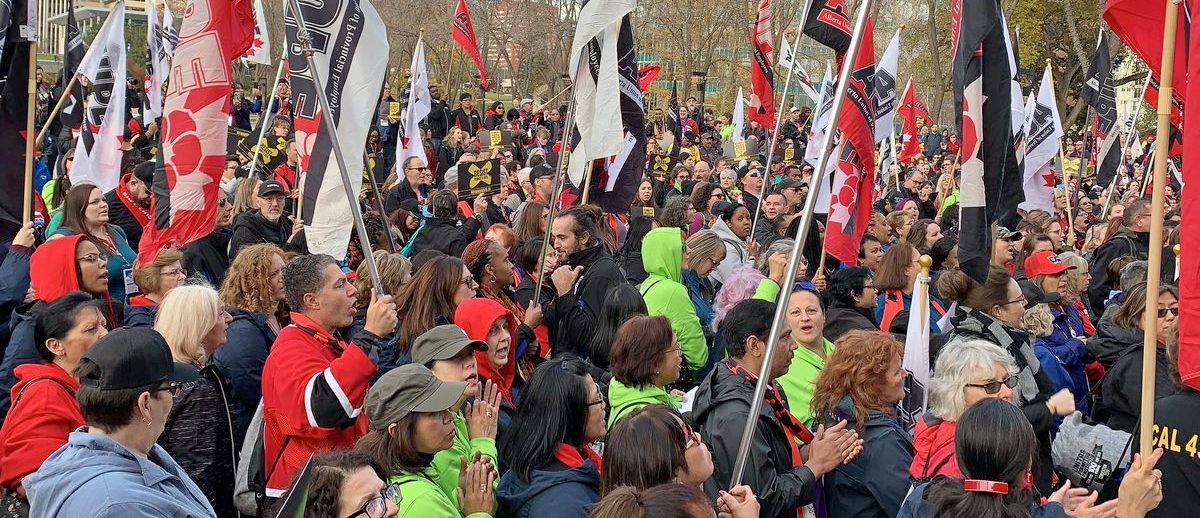
Rally against cuts to social programs, Edmonton, October 18,
2019.
Alberta has a fixed election date, with the election taking
place on the last Monday in May of a four-year term, which falls
this year on May 29. The writ was dropped on May 1 and
nominations close on May 11.
The people of Alberta face many serious problems in this
election but the most serious is that because of the
cartel-party system of government, they exercise no control over
the election process. They do not choose the candidates of the
parties who are contending for seats and to form the next
government. They do not set the platforms of these parties, nor
control what the ruling elite and their media say are the
issues, nor are their views sought on any issue which they might
set themselves.
All that the people of Alberta can say for certain is that the definition of democracy as rule of the people and rule of the majority is a fraud because they constitute the majority and they do not rule. The fraud lies in how the votes cast are said to represent this or that view which constitutes a mandate. How can you aggregate x number of votes to make one view? It is mathematically impossible. Views are views and numbers are numbers.
The feat is accomplished by claiming the democracy is representative. Your vote authorizes a representative to speak and act in your name and that representative in turn swears allegiance to the King and pledges to act in his name. The party that wins the most votes gets to wield the King's prerogative powers and set a course in sync with the King's values which, because you permitted the representative to act in your name, become ipso facto your values.
The challenge facing the workers' movement is how to intervene in the elections on the basis of the independent politics of the working class. These are established on the basis of the mass democratic method which requires holding informed discussions amongst the people. Such exchanges of information, views and proposals provide the participants with the orientation they need to work out their own vantage point. This means how to intervene in a manner that goes to their advantage, that works in their favour. Under all conditions and circumstances they need to be an organized force which can discuss freely, provide itself with information so that it can distinguish what is relevant and what is not and decide for itself how it can speak for itself.
The newspapers and websites of CPC(M-L), the Party's Workers'
Centre and its online Workers' Forum are available to
them, to communicate with others, share experiences and take
stands which they think are appropriate.
During the past four years, Alberta workers have put forward solutions to the problems that society faces in order to fight a barrage of anti-worker legislation that is attempting to crush the unions and criminalize collective action. Even the existing minimal employment standards and health and safety legislation was subject to the UCP's slash and burn. Under its current leader Danielle Smith, the UCP is hell-bent on pursuing what it calls "real health care reform" and measures which will further dismantle the system of public education.
Many unions as well as community organizations have been waging campaigns for the resources needed to meet the demands of the workers, without which there is no solution to the crisis of health care, education and other social programs. Working conditions in hospitals, seniors' homes, long-term care, and community and home care continue to deteriorate, while real wages have been declining for over 10 years, resulting in acute shortages of staff.
Paramedics are leading the fight for ambulance services, which are literally a matter of life and death. Nurses and other health care workers are demanding higher wages, which are necessary to resolve the staffing crisis. Long-term care workers are insisting on mandatory staffing ratios, and an end to privatization.
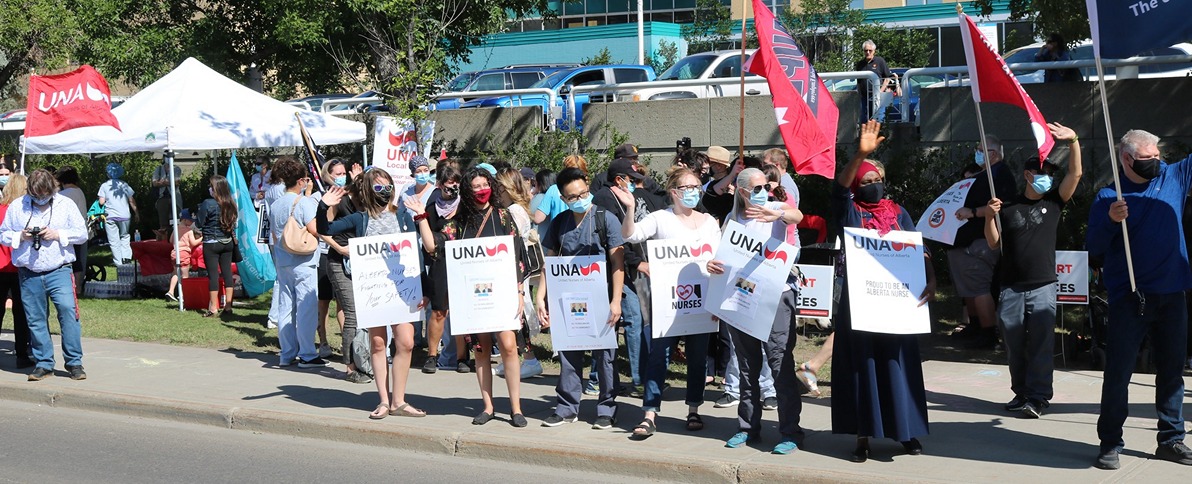
Health care rally, Edmonton, August 12, 2021
Teachers continue to organize their Stand for Education campaign, for a curriculum which meets the needs of their students and a modern society; for class sizes which allow them to meet the needs of their students; and for wages acceptable to them. Community activists are organizing for an end to homelessness and deaths from street drugs, the number of which is rising.
Indigenous Nations are holding the government to account for massive "leaks" from the tailings ponds in the Tar Sands and other serious pollution endangering their communities and the land and water they protect.
Workers in the meat processing plants took the lead during the pandemic and continue to fight against speed ups and for safe working conditions. Railway workers are continuing their fight for safety on the railways while a staggering number of derailments take place across Canada and the U.S., in which rail workers continue to be killed. Warehouse and delivery workers are waging a fight for a union while the anti-worker labour board upholds Amazon's fairy tale that the drivers are not Amazon employees.
Camp workers at the giant Wapasu work camp in the oil sands are fighting to force the company to retract layoff notices after they refused to re-open their contract and accept massive wage cuts at a time of soaring inflation. The layoffs amount to an illegal lockout by the U.S. monopoly Civeo. Migrant workers are courageously demanding Status for All including immediate permanent residency for all the undocumented workers.
Farmers have experienced huge increases in the cost of inputs such as fertilizer, fuel, machinery and commercial feed for livestock. They have never received a smaller share of the retail price of the food they produce, while the oligopolies that control processing and retail food distribution are making record profits.
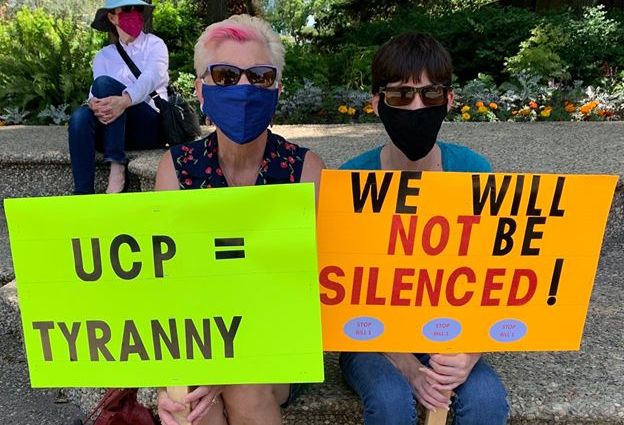 There is strong sentiment to rid
the province of the UCP and its anti-worker, anti-social agenda,
with its racism, misogyny, homophobia and all-round attacks on
rights. For the rulers, the issue is to stave this off by
dividing the people along so-called right-wing and left-wing
politics and political parties, despite the fact that they are
all part of the same cartel which blocks the people from coming
to power and speaking for themselves.
There is strong sentiment to rid
the province of the UCP and its anti-worker, anti-social agenda,
with its racism, misogyny, homophobia and all-round attacks on
rights. For the rulers, the issue is to stave this off by
dividing the people along so-called right-wing and left-wing
politics and political parties, despite the fact that they are
all part of the same cartel which blocks the people from coming
to power and speaking for themselves.
The vacuum of leadership is such that during Jason Kenney's term in office, and now under Smith, the society has experienced unprecedented anarchy and violence, with increasing violence against women, racist attacks, thousands of preventable deaths, growing poverty and homelessness, and a profound refusal by government to carry out its social responsibilities. Far from addressing the problems the working people are raising, the people of Alberta are being subjected to a barrage of attack ads and incessant polling as to who is leading, who is gaining, and what the numbers supposedly mean.
It is said that the UCP will take the vast majority of seats outside of Edmonton and Calgary, with Edmonton a sure thing for the NDP and the final outcome of the election dependent on Calgary. The disinformation presents the election as a popularity contest between NDP Leader Rachel Notley and UCP Leader Danielle Smith, with each presenting the other as the devil incarnate. One poll after another is touted to promote the one which is allegedly the most popular in a manner which makes a mockery of the word popular.
And all of this before the writ was even dropped!
Information
There are 87 constituencies in Alberta. On adjournment of the fourth session of the 30th legislature on March 23, the United Conservative Party (UCP) held 60 seats; the Alberta New Democratic Party (NDP), 23 seats; and Independents, two. One Independent was elected as a UCP candidate, the other as an NDP candidate. Two seats were vacant.
There are 12 registered political parties. Only the UCP and NDP are expected to put forward full slates. As of April 29, ten parties had nominated candidates before the writ was dropped:
- Advantage Party of Alberta: 3,
- Alberta Party: 18
- Buffalo Party: 1
- Communist Party-Alberta: 3
- Green Party: 31
- Independence Party of Alberta: 7
- Liberal Party: 11
- New Democratic Party: 84
- United Conservative Party: 87
- Wildrose Independence Party: 2
Two registered parties have not yet nominated candidates:
- Pro-life Alberta Political Association
- Reform Party of Alberta
Compensation for Egregious Harms Experienced by First Nations Children
Revised Final Settlement Agreement
 The First Nations Leadership Council
(FNLC) and the Indigenous Child & Family Services Directors
Our Children Our Way Society welcome the completion of a revised
Final Settlement Agreement on compensation. The $23.2 billion
agreement will provide compensation for all children and
families who endured Canada's discrimination through the First
Nations Child and Family Services program and Jordan's
Principle, including those formerly excluded.
The First Nations Leadership Council
(FNLC) and the Indigenous Child & Family Services Directors
Our Children Our Way Society welcome the completion of a revised
Final Settlement Agreement on compensation. The $23.2 billion
agreement will provide compensation for all children and
families who endured Canada's discrimination through the First
Nations Child and Family Services program and Jordan's
Principle, including those formerly excluded.
Grand Chief Stewart Phillip, President of the Union of BC Indian Chiefs stated: "Yesterday, we bore witness to the unparalleled and unprecedented recognition of and compensation for the egregious harms experienced by First Nations children, their families, and communities, as a result of Canada's discrimination. We must reflect on, celebrate, and honour our children who became victims and survivors, some of whom are with us and some whom have passed on, whose stories have led to the revised Final Settlement Agreement on Compensation for First Nations Children and Families, being achieved, to end the cycle of child removal and abuse. We are responsible to continue the fight for justice and transformation of First Nation child and family services."
The First Nations Child & Family Caring Society and the Assembly of First Nations filed a human rights complaint against Canada in 2007. The complaint was substantiated nearly a decade later when the Canadian Human Rights Tribunal (CHRT) ruled that Canada had discriminated against First Nations children and families through its flawed and inequitable provision of First Nations child and family services. The CHRT found that Canada had long been aware of the discrimination and of its adverse impacts on children, including the delay and denial of critical services and the unnecessary removal of children from their families, communities, and cultures.
Cheryl Casimer, First Nation Summit Political Executive stated: "Achievement of the revised Final Settlement Agreement on Compensation for First Nations Children and Families is a long-fought and long-awaited step towards meaningful reconciliation through recognition and compensation for victims, survivors, and their families. No settlement will ever undo or reconcile the harms experienced, which continue to have revolving impacts on our families and communities. It is our responsibility to continuously work to end the imposition of colonization on our peoples, as manifested through ongoing child welfare systems, policies, and practices."
The CHRT ordered Canada to compensate the children and families who suffered discrimination. Two class actions were subsequently filed, seeking compensation for a broader group of children and families with more substantial compensation than could be ordered by the CHRT. In July of 2022, Canada reached a $20 billion dollar agreement with the AFN and the class action representatives to settle both class actions and the CHRT compensation orders. However, the Caring Society argued that this agreement left out many children and families who were entitled to compensation, under previous CHRT orders and upon review, the CHRT rejected the agreement in October 2022.
Regional Chief Terry Teegee for the British Columbia Assembly of First Nations stated: "Compensation for all 'classes' of victims, who experienced inequitable service provision by Canada, reflects our continual and collective pursuit of justice for our children, youth, and families, nothing less of which will suffice, as demonstrated in December 2022. Yesterday's achievement is cause for tremendous celebration and will be remembered in our hearts and history books, as a pivotal moment in our shared history. With that in mind, let us work towards the long-term reform of child and family services, including prioritization of long-term, sustainable, predictable, and needs-based funding to ensure our people are adequately equipped to exercise their inherent rights to jurisdiction over child and family services."
Yesterday a revised settlement agreement was announced, which includes an additional $3.2 billion dollars to ensure that all the children and families contemplated in the CHRT orders will receive a minimum of $40,000 in compensation.
We hold our hands up to Cindy Blackstock and the Caring Society for their unrelenting efforts to ensure that all the children and families entitled to compensation are included in the Final Settlement Agreement.
Mary Teegee (Maaxw Gibuu) from Takla Nation, Chair of the Indigenous Child & Family Services Directors Our Children Our Way Society stated: "When we started this process all those years ago, we had three goals: to end discrimination against children and families, to ensure discrimination never happens again, and to compensate the children and families who suffered. Yesterday we delivered a measure of justice to our children. They are our most precious resource, and they deserve nothing less. But our work is not done. We will continue to work diligently toward long-term reform of child and family services to ensure that no child suffers discrimination ever again."
(ubcic.bc.ca, April 4, 2023)
News and Views on Matters of Concern
It's High Time the Ontario Teachers' Pension Fund Divests from Union-Busting Firm Stone Canyon Industries Holdings Inc.
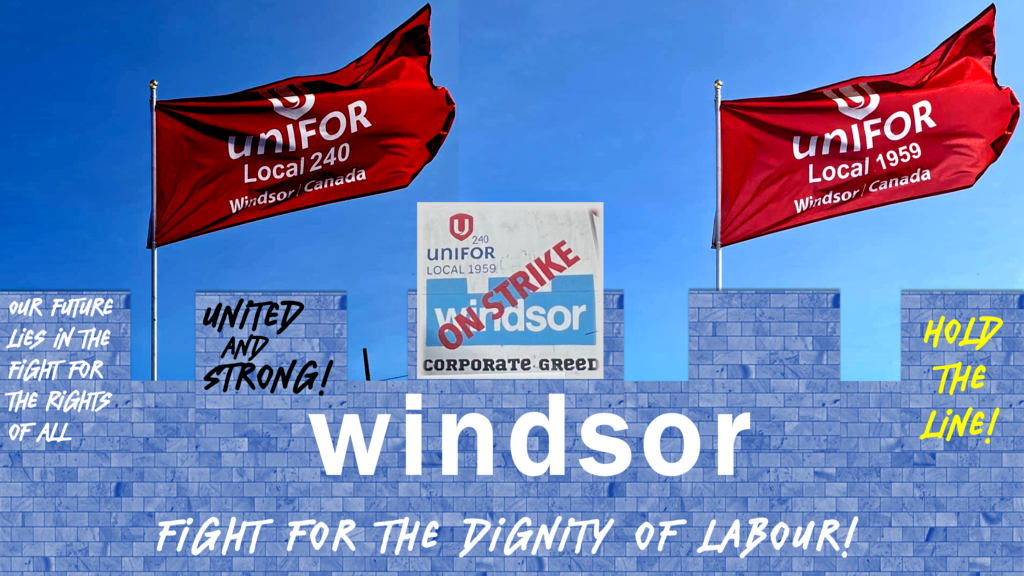
The Ontario Teachers' Pension Plan (OTPP) has now changed its representation on Stone Canyon Industries Holdings Inc.'s eight-person management board since concerns were raised by its shareholders -- Ontario teachers -- about its investments in the union-busting company.[1] Michelle Lung has now replaced Ashfaq Qadri who was a member of OTPP's equities team.
Lung is a Chartered Professional Accountant (CPA) and Chartered Business Valuator (CBV) in Ontario. She is the Director of the Private Capital Global Funds team and has been with the OTPP since 2014. According to her biography on Stone Canyon's website, "she has been involved in the origination, evaluation, execution and post-investment monitoring and management of numerous fund investments." Previously, she worked as a Senior Associate at PwC in both their Consulting & Deals and Audit groups. Lung graduated from the University of Toronto.
CPAs in Ontario are bound by the CPA Code of Conduct which requires members and firms to act in the public interest. The code states that the "public's trust and reliance on sound and fair financial and management reporting and competent advice on business affairs – and the economic importance of that reporting and advice – impose these special obligations on the profession." As such, its members are expected to "avoid any action that would discredit the profession." According to the code, "Members and firms are expected to be straightforward, honest and fair dealing in all professional relationships."
The Code of Conduct contains guidelines to determine ethical or unethical conduct. Whatever juridical standards exist to determine ethical misconduct, from the point of view of a majority of Ontario teachers, union-busting definitely constitutes ethical misconduct.
Officially, in a case where a member faces an "ethical conflict," the member is obliged to consider the following:
- relevant facts;
- ethical issues involved;
- fundamental principles and provisions of the CPA Code
applicable to the matter in question;
- established internal procedures; and
- alternative courses of action.[2]
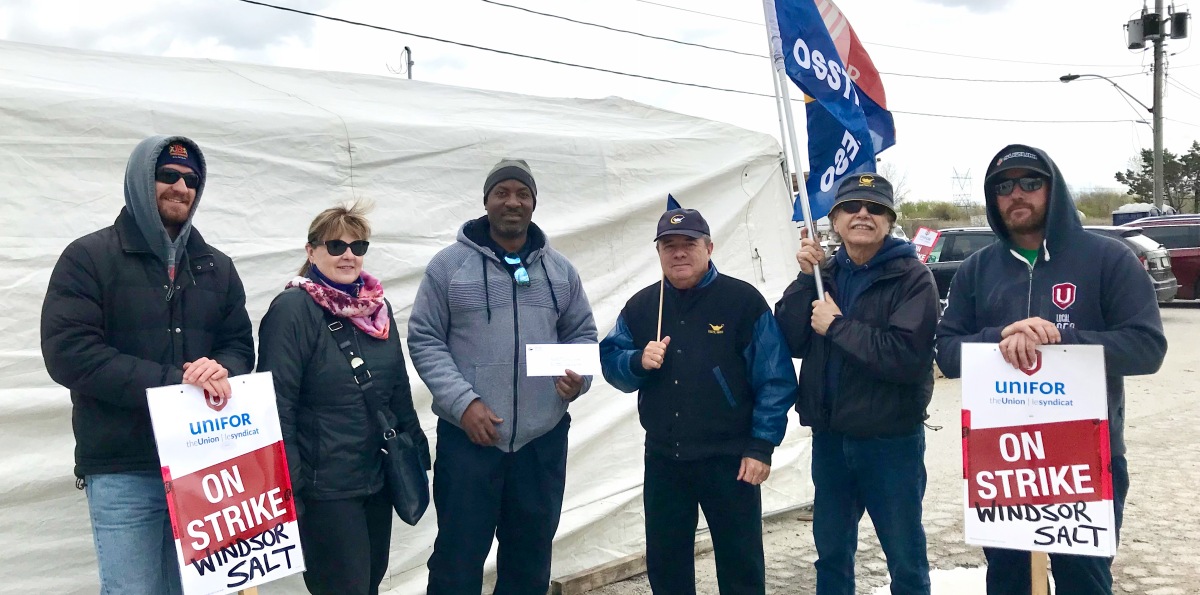
Delegation of retired teachers and education workers from
Greater Essex OSSTF-Active Retired Members visits Windsor Salt
picket line, April 24, 2023 to support striking workers.
Leadership of Stone Canyon
Many of Stone Canyon's key senior leadership, including its Co-Chairman and Co-CEO, its President, and both its Senior Vice Presidents were formerly employed by a company called Knowledge Universe (KU) which was founded in 1996 and owned by Michael Milken after he was released from prison and no longer permitted to carry out securities trading.
Milken is the notorious U.S. financier who was convicted and sentenced to prison time in 1990 for violating securities laws and was stripped of his ability to engage in the securities industry. "He is known for his role in the development of the market for high-yield bonds ("junk bonds"), and his conviction and sentence following a guilty plea on felony charges for violating U.S. securities laws," Wikipedia informs.[3] It adds that "Milken was indicted for racketeering and securities fraud in 1989 in an insider trading investigation. In a plea bargain, he pleaded guilty to securities and reporting violations but not to racketeering or insider trading. Milken was sentenced to ten years in prison, fined $600 million (although his personal website claims $200 million) and permanently barred from the securities industry by the Securities and Exchange Commission. His sentence was later reduced to two years for cooperating with testimony against his former colleagues and for good behaviour. Milken was pardoned by President Donald Trump on February 18, 2020."
The sentencing judge for Milken's crimes stated at the time, "When a man of your power in the financial world, at the head of the most important department of one of the most important investment banking houses in this country, repeatedly conspires to violate, and violates, securities and tax laws in order to achieve more power and wealth for himself and his wealthy clients, and commits financial crimes that are particularly hard to detect, a significant prison term is required."
In response to his sentence, Milken reportedly stated: "What I did violated not just the law but all of my principles and values. I deeply regret it, and will for the rest of my life. I am truly sorry."
Speaking about the specifics of the case, the New York Times said the judge indicated she believed that the former financier had tried to prevent investigators from uncovering his crimes by suggesting to subordinates that they dispose of important documents. She also said she believed that Mr. Milken had misled a client. She is quoted as saying to Milken at sentencing, "Your crimes show a pattern of skirting the law, stepping just over to the wrong side of the law in an apparent effort to get some of the benefits of violating the law without running a substantial risk of being caught."
Wikipedia notes, "Milken's compensation while head of the high-yield bond department at Drexel Burnham Lambert in the late 1980s exceeded $1 billion over a four-year period, a record for U.S. income at that time." With a net worth of U.S.$6 billion as of 2022, he is among the world's very rich people.
KU, the company Milken founded and for which many of Stone Canyon’s senior leadership worked, held a large number of subsidiaries related to private in-person and online education, including KinderCare Learning Centers, the largest for-profit child care provider in the United States. KU sold off its subsidiaries in 2015 just after Stone Canyon was established in 2014. Forbes reported in 2017 that Stone Canyon is headquartered at the same Santa Monica address as the Milken Institute. Stone Canyon Industries was registered with the California Secretary of State in 2014 by Stanley Maron, Milken's longtime lawyer. A spokesperson for Milken who spoke to Forbes in 2017 admitted that Milken was an investor in Stone Canyon but downplayed his influence stating, "Scores of firms invest Mike's money and he is not involved in their investment decisions, does not control them and doesn't sit on their boards."
In addition to its obvious links with a notorious proponent of
private education and convicted criminal, albeit now pardoned by
Trump, Stone Canyon has definite direct links with the U.S.
state. This makes it likely that Stone Canyon's control of salt,
which is a strategic Canadian natural resource, is overseen by
officials of a foreign government with an interest in enforcing
anti-worker anti-social activities.
Listed on its Leadership page as its only Senior Advisor is Mark
Weinberger, former global chairman of Ernst and Young, today EY.
Weinberger is the former Assistant Secretary of the U.S.
Department of the Treasury (Tax Policy) in the George W. Bush
Administration. He was subsequently appointed by President
Clinton to serve on the Social Security Administration Advisory
Board. He then served as a member of President Obama's
Infrastructure Task Force and was on President Trump's former
Strategic and Policy Forum made up of 15 CEOs tasked with
helping Trump establish an agenda that benefits the rich. He
also worked in the U.S. Senate. At the World Economic Forum he
was a member of its International Business Council and a Global
Agenda Steward for Economic Progress. He co-chaired the Russia
Foreign Investment Advisory Council with then Russian Prime
Minister Dmitry Medvedev and served as Chairman of the
International Business Leaders Advisory Council to the Mayor of
Shanghai. He has also been a speaker at the Milken Institute.
Weinberger is on the Board of Directors of Johnson & Johnson and MetLife. He also serves as a Senior Advisor to Teneo, one of the world's biggest public relations firms, which hires politicians to provide "strategic counsel to CEOs and executives of the world's top companies." He is also a Strategic Advisor to the Board of FCLTGlobal, which focuses on "long-term investing and corporate governance."[4] Weinberger is on the CEO Advisory Council of JUST Capital which calls itself "an independent nonprofit dedicated to building an economy that works for all Americans by measuring and improving corporate stakeholder performance... " It says it ranks companies "on issues that Americans care about most..." He sits on the Board of Directors of the U.S. National Bureau of Economic Research, is a Senior Advisor to Chief Executives for Corporate Purpose (CECP), and a member of the Aspen Economic Strategy Group.
CECP says it is "a trusted advisor to companies on their corporate purpose journeys to build long-term sustainable value ..." It "shares actionable insights with its CEO-led coalition to address stakeholder needs."[4]
Stone Canyon's Advisory Board includes former U.S. Ambassador-at-Large Henry A. Crumpton, whose bio states is "a 24-year veteran of the CIA's Clandestine Service, he operated in the foreign field, including tours as Chief of Station, for most of his career." Interestingly his bio lists him as still being an Ambassador-at-Large to this day. In 2001 after the 9/11 attacks he was responsible for day-to-day running of the criminal U.S.-led war in Afghanistan for its first year, according to Wikipedia.[6] That war, which Canada was also part of, destroyed the country and continues to this day.
From 2003-2005, Crumpton was the Chief of the CIA's National Resource Division, responsible for all Clandestine Service operations in the United States [emphasis added] at a time the U.S. was openly torturing prisoners on its military bases. In 2005 at the height of the "War on Terror" launched by U.S. President George W. Bush -- more aptly called the "War of Terror" -- Bush appointed Crumpton the U.S. Coordinator for Counterterrorism at the Department of State with the rank of Ambassador-at-large. Besides other things, this gave him diplomatic immunity.
All in all, given Stone Canyon's union-busting activities at Windsor Salt and its ties to the worst elements of the U.S. government and establishment, it would not be a stretch to conclude that it is high time the Ontario Teachers' Pension Fund divest from Stone Canyon Holdings Inc. and find something pro-social, not anti-social, to do with the teachers' pension money.
Notes
1. For background on concerns from
teachers about their pension plan’s investments in SCIH see
these articles on EmpowerYourselfNow.ca: Teachers
Pension Plan Major Investor in US Company Attacking Windsor
Salt Workers, Union-busting
in Canada by U.S. Law Firm Jackson Lewis, Teachers
Raise
Concerns About Having a Say Where Pension Funds Are Invested.
2. The full Code of Conduct can be found here.
3. "Michael Milken," Wikipedia.
4. According to Wikipedia, Teneo is a privately owned public relations and advisory company founded in June 2011 by Declan Kelly, Paul Keary, and Doug Band. Headquartered in New York City, it currently has more than 1,450 employees located in 40 offices. In 2019, Teneo sold a majority stake to CVC Capital Partners, at a total valuation of around $700 million. Its subsidiaries include Teneo Canada and WestExec Advisors. Its website confirms:
"Teneo's government and public affairs offering provides strategic counsel and tactical execution to the leaders of large and complex businesses on navigating volatile political landscapes. Our team of senior specialists have deep expertise in the top policy priorities of Quebec, Ontario, and the federal government.
"Our team of government and public affairs advisors provide political intelligence derived from our experts' deep understanding of political dynamics and unrivaled networks, developed over decades in every major market, provides strategic counsel to CEOs and executives of the world’s top companies."
One of their government and political affairs senior
advisors "navigating today's volatile geopolitical landscape"
is Canada's former Prime Minister Brian Mulroney.
5. CECP's website states: "Founded in 1999 by actor and
philanthropist Paul Newman and other business leaders, CECP is
a movement of more than 200 of the world's largest companies
that represent $7.7 trillion in revenues, $37.4 billion in
total community investment, 14 million employees, 22.5 million
hours of employee engagement, and $21 trillion in assets under
management. CECP helps companies transform their strategy by
providing benchmarking and analysis, convenings, and strategy
and communications in the areas of societal/community
investment, employee engagement, environmental social
governance/sustainable business, diversity equity inclusion,
and telling the story."
6. "Henry
A. Crumpton," Wikipedia.
Demands for Canadian Workers
to Submit to
U.S. War Economy
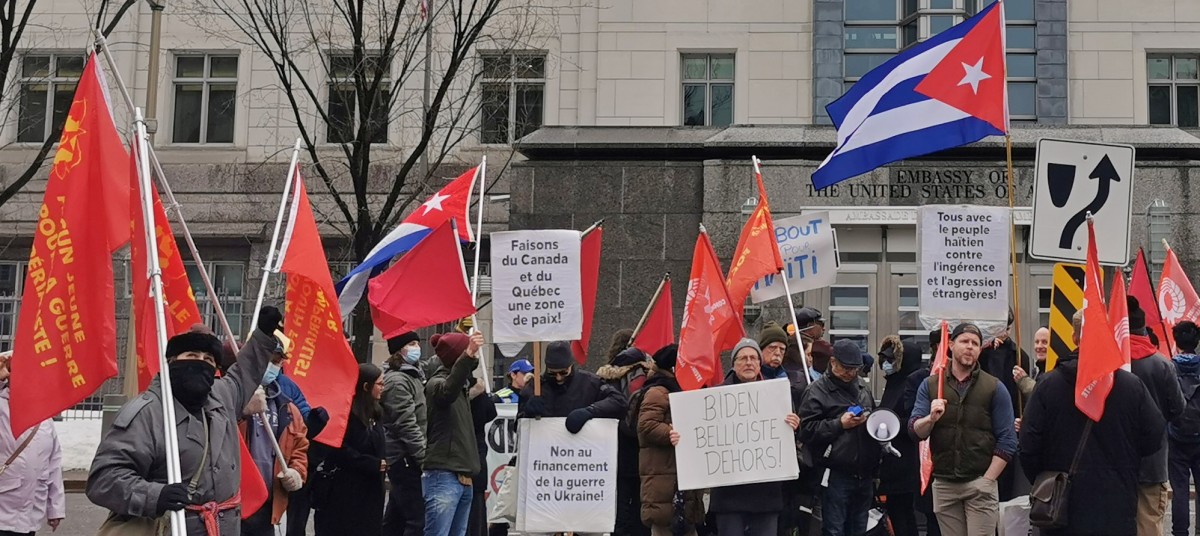
Picket outside the U.S. Embassy denounces visit of war president
Biden to Canada, March 23, 2023.
When he travelled to Canada, U.S. President Biden told Canadians they do not have to manufacture much of anything, just package semiconductors and mine the resources that abound and send them to the United States. Some people seem to agree and believe that submitting to this U.S. dictate will result in what they call "good unionized jobs" and a "green economy."
The Trudeau government and a few others endorse what Biden is saying, doing and demanding. With their submission comes an understanding that goes beyond trade and what they call "good unionized jobs" and a "green economy." Acquiescence to the U.S. line of march suggests Canada is safe and comfortable within the U.S./NATO/NORAD aggressive military alliance and that China and Russia are enemies.
To say the least, it was shocking to hear leaders of Canadian national trade unions calling for Canada to be "a partner in President Biden's plans" within the anti-everyone else Inflation Reduction Act, swearing allegiance to the Biden administration, and being "a running mate" of the U.S. in its "damn good economic race" and wars against competitors.
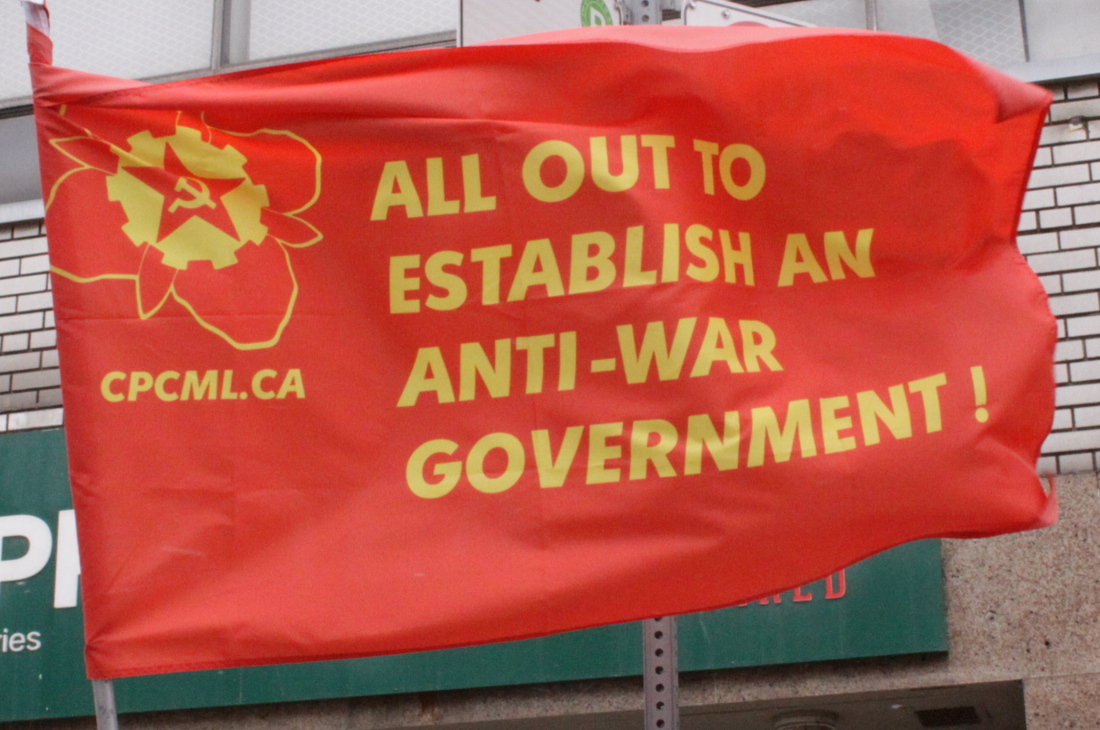
The workers' movement is faced with the issue of how to address what certain union leaders have said and pledged. The movement cannot remain silent in the face of Canada's appeasement of the U.S. in its warmongering and attempts to put Canada's entire natural and human resources at the disposal of its oligopolies and war preparations. Canadians want Canada to be a Zone for Peace, not part of a military and economic block under the thumb of the U.S. empire builders.
Appeasement of the U.S. imperialists has not benefited Canadian workers or their communities in the past, to the extent that Canada has once again been reduced to a hewer of wood and a drawer of water, a conduit for oligopolies to make windfall profits.
Every day examples emerge of U.S. cartels using their power and privilege to violate workers' rights and eliminate their unions. What is happening at Windsor Salt in Ontario and Nova Scotia, where a California holding company has come into Canada to destroy workers' rights, unions and standard of living is not a one-off. The workers' movement across Canada has plenty of experience with U.S. company hooliganism that cannot be swept under the carpet with hugs and kisses for Biden.
Furthermore, Canadian and U.S. workers are united cheek by jowl in a common cause. Canadian and U.S. workers want a new direction for the economy to solve their problems and to humanize the social and natural conditions.

Windsor and District Labour Council delegation joins striking
Windsor Salt workers on their picket line,
April 11, 2023
Note
1. On March 28, a press release from the National Office for Canada of the United Steelworkers provided comments from the National Director:
"'With his Inflation Reduction Act (IRA), President Biden committed hundreds of billions of dollars to fight climate change, invest in infrastructure and explicitly create good unionized jobs. The President knows that Canadian workers and the products we mine and manufacture are critical to making sure he meets his climate and economic goals. The Prime Minister and members of his cabinet have told workers they understand that too. This budget is their chance to deliver.'
"Along with Canadian aluminum, steel, cement and wood, critical minerals such as nickel, steel-making coal, cobalt, copper, lithium, indium and tellurium are mined and produced in Canada – with far-lower carbon impacts and by workers often supported by good unionized jobs.
"In addition to calling for improved access to employment insurance and investments to expand health care -- including dental and pharma care, ... investments in a sustainable jobs plan and a commitment to showcasing Canada's lower-carbon products are crucial, if the government is serious about supporting Canadian workers and earning more exemptions to the U.S. 'Buy America' rules.
"'From promising anti-scab legislation to investing in so-called "just transition" this government has done a lot of talking about supporting Canadian workers, but President Biden has shown us what real action looks like.
"'To make sure that high-quality, family-supporting unionized jobs stay in Canada and that both our countries meet our goals of a lower-carbon economy, workers need the Canadian government to take this chance to earn our continued place as a partner in President Biden's plans.'"
On March 27, the National President of Unifor Lana Payne said the following in an address to the United Auto Workers in the United States:
"Just last week I attended an official dinner, welcoming your President, Joe Biden, to Canada. Well me and a few hundred other Canadians.
"President Biden not only brought a message of shared opportunity and unity, he brought a message of solidarity. I don't think the word "union" was mentioned so many times, in such a positive light, in the history of our House of Commons. It filled me with pride. [...]
"I will say that, from our vantage point, what the U.S. is doing – and the Biden Administration specifically – on economic and industrial policy, is quite impressive. I've not seen this level of ambition to on-shore critical manufactured goods, invest in domestic value chains and promote clean tech – from any government, in my lifetime."
"If this is the economic race the U.S. has started, it's a damn good one. And it's one that Canada and the U.S., like most things, will win as running mates. A race that will be won by securing good jobs, with collective agreements, for all.
"A race that will be defined by its worker-centred policies. Our members were incredibly relieved to see that the Inflation Reduction Act set a special carve-in for Canada, on EV consumer rebates."
Mourn Our Dead! Fight for the Living!
Suncor Workers Raise Need to Exercise Control Over Working Conditions
Suncor, one of the "big five" oligopolies in the oil sands, and contractor Christina River Construction entered guilty pleas on one count each of violating Alberta's Occupational Health and Safety (OH&S) Act on April 14 in the death of Patrick Poitras. He died on January 13, 2021 after being directed to clear snow from a tailings pond. The ice gave way and his bulldozer crashed through the ice. Conditions were so dangerous that rescue workers were not able to recover his body for two days.
|
Patrick was only 25 years old. He had worked in the oil sands for six years, and was planning to return home to New Brunswick for good in mere months. He spoke to his father the night before he died, expressing fear about the dangerous conditions in which he was expected to work.
Twenty-eight charges were initially laid against the companies in November 2022, 19 against Suncor and nine against Christina River Construction. The charges involved ignoring safety protocols, failing to properly check the thickness of the ice while ignoring previous measurements showing the ice was too thin to bear the weight of a bulldozer.
Available ice measurements showed the minimum ice thickness was less than 17 inches as required by Suncor's safety plan. Suncor was also charged with failing to take the weight of snow into account when working on a frozen pond and failure to ensure the site was under the supervision of an ice engineer.
Christina River was also charged with failing to use ground penetrating radar to determine the ice thickness and failing to test if the ice could handle the load of the vehicle. Charges also cited the failure to provide a flotation device and a safety plan in case the bulldozer was submerged.
When the case came to trial on April 14, 26 of the 28 charges were dropped without explanation, and Suncor and the contractor each pleaded guilty to one charge, a deal proposed through a joint submission from the Crown and the defence, and accepted by the presiding judge. They were handed fines of $420,000 and $325,000 respectively.
Patrick Poitras was the twelfth worker to die on the job at Suncor since 2014, not including COVID deaths, which were never reported. Yet the Crown prosecutor dropped most of the serious charges, and instead made a deal, so that those responsible could walk away unscathed.
Suncor had gross profits of $27.707 billion, and net income of $9.077 billion in 2022. It may be legal, but in no way can it be called justice when governments and the state permit these oligopolies to carry on, issuing their rote apologies, and noting the fines in their account books as a minor cost of doing business.
Patrick's heartbroken family has been speaking out strongly about this completely preventable death. His mother, Cathina Cormier, said the Alberta courts failed to provide justice for her son's death. "It's a joke," Cormier told the Journal of Commerce, calling the $420,000 fine of the multibillion-dollar corporation Suncor, a "slap on the wrist." His father spoke of the fact that his son had been very worried about the danger of the job he was expected to do, and that he had urged his son to refuse dangerous work.
Every death of a worker, every precious life ended, brings to the fore the question of how workers can defend their right to safe and healthy workplaces. Even the limited rights of workers that exist in law through the Alberta OH&S legislation have been hollowed out by the Kenney government through Bill 47.
Workers' Forum wrote at the time, "Bill 47 is the latest in a series of legislated attacks on workers and their defence organizations. While the safety and rights of workers are acknowledged in words, Bill 47 significantly lowers the bar when it comes to employer obligations, deprives workers of the right to select their own health and safety representatives, guts the joint worksite health and safety committees, imposes new definitions of unsafe work, and opens the door for employers to discriminate against workers who refuse unsafe work." Bill 47 established a new process for investigating potentially unsafe work, where the employer alone investigates when a worker refuses unsafe work. The worker no longer has the support of a member of the joint workplace OH&S Committee or a fellow worker of their choice.
According to the Criminal Code of Canada, a person who in doing anything, or omitting to do anything that is his duty to do, shows wanton or reckless disregard for the lives or safety of other persons, is guilty of criminal negligence. Duty means duty imposed by law for the purpose of this section. The death of a person through criminal negligence is considered a culpable homicide, that is manslaughter or murder. Yet the usual penalty when a worker dies is a fine.
The Westray Act, which came into force in 2004, was the culmination of over ten years of work by workers and their organizations for legislation to hold employers criminally responsible for injuries and deaths of workers due to their actions or inactions.[1] Almost 20 years later, there have been only two convictions, and only one person has gone to jail for criminal negligence causing a workplace death. In the twenty-one years from 2001 to 2021, 320 workers died in the oil and gas sector in Alberta and Saskatchewan alone.
Workers and their families continue to speak out and to resist these attacks on their rights, and show their determination to hold governments and employers to account. Workers know from experience that they must rely on their own unity and organization. They are the ones who take up their social responsibilities for safe workplaces, and it is the workers who must exercise control over their working conditions.
Note
1. On May 9, 1992, all twenty-six miners working in the Westray coal mine in Nova Scotia were killed when methane gas ignited, causing an explosion. Workers, union officials and government inspectors had all raised serious safety concerns before the tragedy, all of which the company had refused to act on.
Migrant Workers Demand Accountability
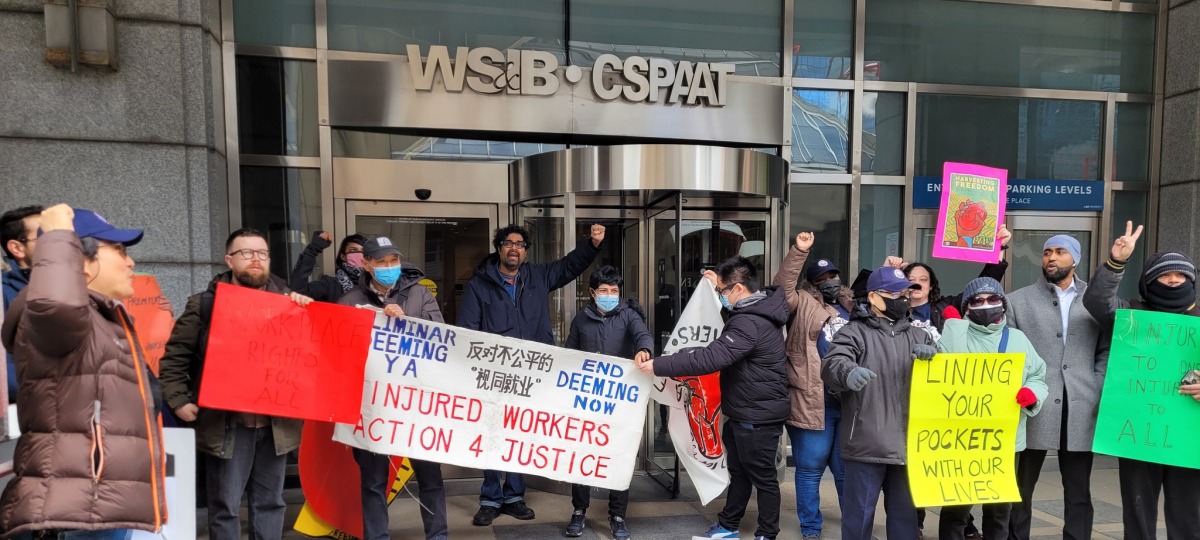
Action outside WSIB, March 21, 2023
On March 21, the organization Injured Workers Action for
Justice and
Justice for Migrant Workers held an action in defence of
the
right of migrant workers to receive compensation for workplace
injuries
and diseases from Ontario's Workplace Safety and Insurance Board
(WSIB). The WSIB is notorious for denying compensation and
treatment to
injured workers and favouring the interests of employers, and
migrant
workers in particular face additional discrimination.
At the action held on the occasion of the International Day for
the Elimination of Racial Discrimination, 21 migrant injured
workers told stories which show how the WSIB process is racist
and worsens the physical, mental and emotional state of workers
who have suffered a workplace injury. Last year these same
workers wrote an open letter to demand change to Ontario's
discriminatory workers' compensation system and the systemic
racism they face at the WSIB. Since that letter there has been zero
change and zero accountability from
the WSIB. This year workers called in to the WSIB because
many migrant injured workers are no longer here in Canada.
Following a workplace injury, many migrant injured workers are
repatriated and forced to recover from their injuries back in
their home country. Canada's racist immigration laws and the
WSIB's discriminatory practices make injured workers feel
powerless by isolating them and breaking up injured worker
communities. Injured workers' support and solidarity knows no
borders, the organization points out. Workers understand this
and instead are building power through transnational solidarity
and actions.
On the call to the WSIB president, workers raised two main issues: their horrific experiences of improper health care support and the racist reality of the practice of "deeming" workers. Posted below is an extract from the leaflet issued on that occasion.
The WSIB Must Provide Real Health Care for Injured Workers
Because of exploitation and unsafe labour practices, migrant workers are at heightened risk of becoming injured on the job.
Once injured, many injured workers, and especially migrant injured workers, face difficulties with improper health care support as they recover from their workplace injury. The WSIB does not provide proper funding of medical treatments and medications that are necessary for workers to recover properly. The WSIB also does not listen to the recommendations that health care providers provide to injured workers. Instead, they often override a worker's doctor's recommendation with their own doctor's opinion. This opinion does not benefit the worker because the WSIB's doctors have not established a strong clinical relationship with the worker. In fact, the WSIB doctors' opinions are often given without them even meeting the injured worker.
For migrant injured workers, many of whom are racialized, these issues are magnified. Following injury, migrant workers are often forced back to their home country by their employer. The WSIB does not provide them with supports that would allow them to stay in Canada to receive proper health care. Instead migrant injured workers are forced to find treatment on their own in their home country. Often these countries do not have accessible health care for workers to help them recover from the complex injuries they suffered working here in Canada.
The reality is that once a migrant worker is injured, Canada and the WSIB often force them deeper into poverty and downloads all health care and worker compensation onto the backs of people in the Global South.
The WSIB Must Abolish the Shameful and Racist Practice of
"Deeming"
The practice of deeming allows the WSIB to cut injured workers' benefits by pretending (or "deeming") that they are working and making money in a suitable job in Ontario. This practice of cutting benefits using fake wages by the WSIB makes injured workers feel disposable and drives many injured workers into poverty. This unfair and make-believe practice is even worse for migrant workers. For migrant injured workers these Ontario jobs are not actually available to them because they have been repatriated and forced back home.
Ensuring Health and Safety of Migrant Workers
Michel Pilon is the Executive Director of the Réseau d'aide aux travailleuses et travailleurs migrants agricoles du Québec (RATTMAQ).
As far as RATTMAQ is concerned, we have many questions about the problem of ensuring the health and safety of the workers we represent. This is mainly due to the fact that the new law adopted by the Quebec government, which is presented as a modernization of the occupational health and safety system, provides that in 80 per cent of companies there will now be health and safety committees.
The big problem for us is how to choose the workers. Will the employer choose them and they will then become puppet committees? How are we going to implement these committees in our sector, who is going to train the workers, and who is going to defend them in case of problems, if the employer is not satisfied with a decision that the worker makes? I am talking about non-unionized workers because 60 per cent of the people we represent, are non-unionized. Who is going to represent these non-unionized workers if they face retaliation from the employer?
The second concern is the whole problem of work injuries and occupational diseases. We denounce the judicialization of this whole process. Employers have the upper hand. They can challenge anything they want and they do it systematically. Non-unionized workers do not have the means to defend themselves. They often give up their rights that exist in the law.
One of the big problems we face is the Prevention Mutuals. These are big law firms in Montreal where lawyers are paid about $200,000 a year to challenge just about anything that can be challenged. But there is no access to justice for workers. They call themselves Prevention Mutuals but I call them Management Mutuals. They don't do any prevention. All they do is manage the file so that it costs employers as little as possible. Their method is to systematically contest the Labour Standards, Pay Equity and Workplace Health and Safety Board (CNESST) files.
We have reached a situation where employers are dictating to the temporary worker which doctor to see and that doctor is often a pro-employer doctor who hides the fact that the worker is suffering from an occupational disease. We often end up with the employer's doctors disputing the diagnoses, the permanent damage, the functional limitations.
Workers do not have the means to access justice. For years, we have been demanding that workers have the right to a lawyer to defend themselves before the courts.
At RATTMAQ, we represent temporary workers, but those we represent and defend in court are the tip of the iceberg. Workers are afraid to make claims. They have closed work permits. They are tied to a single employer. There are plenty of others that we could defend but there are so many employers who have not filed a worker's claim with the CNESST. And there are also so many workers who have not filed a claim with the CNESST because they don't know their rights. First of all, they don't know French and when they finally know their rights, they are often too late with the six-month deadline to file a claim.
I'm thinking of this case of a worker, a case of a worker with lung cancer from the use of fungicide pesticides. I won it last year despite a year and-a-half delay in filing the claim. The judge ruled in my favour because the worker did not know his rights. But, do we have to plead reasonable cause for filing a claim late every time a worker doesn't know his rights?
In order to do our work to defend the rights of migrant farm workers who come to work in Quebec, we have a permanent booth at the Montreal Airport, and we welcome them when they arrive. They all arrive through the Montreal Airport. Last year, we met about 38,800 workers in total at the airport. We have a team of six full-time people on site to greet them. As soon as they leave the international area, they come to our booth.
They are given a diary in which they can write down their working hours, because they often don't write them down. In this diary, there are also barcodes that inform them about their rights in terms of health and safety at work. We set up a WhatsApp link with them, which allows us to send them videos and allows us to communicate visually. Among other things, RATTMAQ has made 14 videos on YouTube on a variety of topics, including one on workplace accidents and illnesses, one on labour standards and one on the Quebec Charter of Human Rights and Freedoms and the Canadian Charter of Rights and Freedoms because we are using both. WhatsApp is free, which is also a big plus. These workers go to work in several regions, sometimes as far away as the Magdalen Islands or the North Shore, and call us for information or even cases.
Recently, a worker was hit by his employer. We went to pick him up, we put him up in one of our emergency residences that we have at RATTMAQ, we filed complaints for assault against the employer and we are in the process of applying for an open permit as a vulnerable worker.
These workers are all in the agri-food sector, whether it is agriculture or food processing, meat or fish. They come from several countries, including Mexico and Guatemala.
It is my ardent wish that the situation of temporary
agricultural workers will improve, that they will have better
access to justice. They don't have it right now. I hope that
this accessibility will be something concrete, and that they
will stop attacking the workers with prevention mutuals that do
not think about prevention but think about the employers'
pockets.
(Translated from original French by TML.)
Workers Continue to Fight for Health and Safety Rights and Compensation
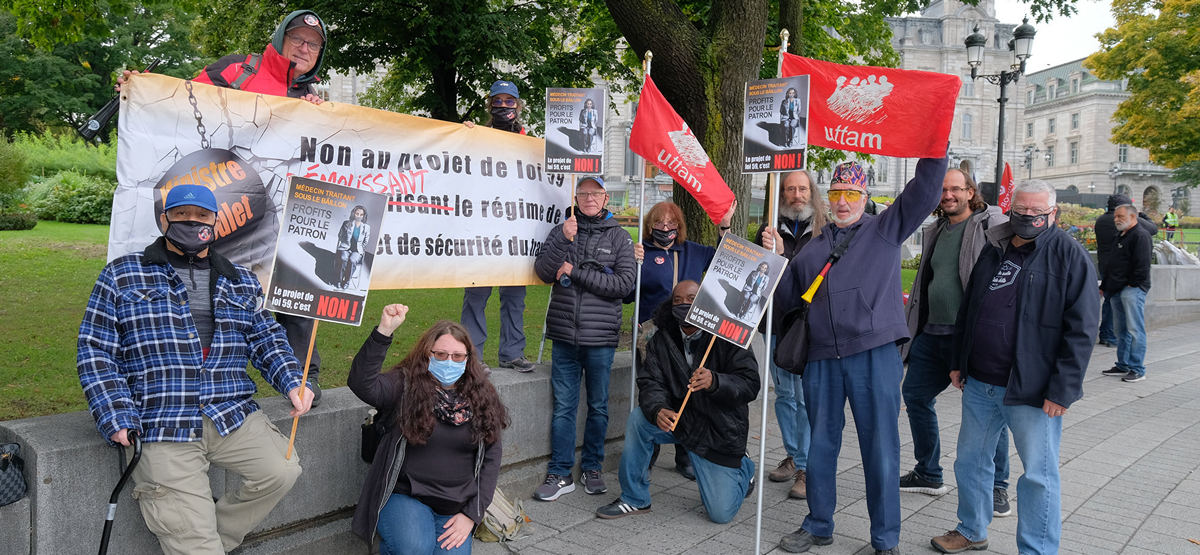
UTTAM contingent at demonstration at Quebec National Assembly
against Bill 27, September 30, 2021
Félix Lapan is a community organizer with the Union des travailleuses et travailleurs accidentés ou malades (UTTAM). This intervention was made during a demonstration in Montreal on April 6 against the Quebec government's Bill 27, An Act to modernize the occupational health and safety regime, adopted on October 6, 2021.
We will continue to shout loud and clear that this reform that was imposed on us is not what we wanted. What comes into effect today are provisions that turn the system of appealing decisions to the Labour Standards, Pay Equity and Workplace Health and Safety Board (CNESST) upside down. These changes will make things more complicated. It will be more difficult than boefre to keep track of workers' compensation cases. This will create confusion and may result in a loss of rights.
This is totally unacceptable and must be denounced. We are here not only because of what is changing, we are also here because of what is not changing. We must continue to fight and denounce this system. It's a highly judicialized system. Employers in Quebec, more than anywhere else in Canada, have invested, not in injury prevention, but in the challenging of injuries. Every year, thousands of victims of work-related accidents and illnesses are forced to go to the Administrative Labour Tribunal to defend their right to compensation and treatment against abusive challenges by employers and unjust decisions by the CNESST. Imposing an obstacle course for people whose health is affected by their work must be firmly denounced. This has to change.
The problem is that a system has been created that gives employers unlimited powers to challenge. It's a system that encourages them to challenge every decision, to challenge injuries, entitlements to medication and medical treatment. They repeatedly challenge the advice of our doctors, our rights to rehabilitation. It is unacceptable that we are constantly forced to defend ourselves in court for obvious injuries and for rights that are written in black and white in the law.
Who pays for these costs incurred because of the refusal to recognize the rights of injured workers and of workers made ill by work? Unionized workers are fortunate to have excellent advocacy services for their rights. It is a good thing that the labour movement has built services to defend its members in court. People who are not unionized sometimes have to mortgage their homes, go into debt or give up rights because of employer challenges.
For employers, of course, repeatedly challenging decisions is a way to control costs. For some employers, it is even a way, in many workplaces, to intimidate workers. It's a way to send the message that you shouldn't make claims, that if you have a work-related injury, it's better for you to go to the unemployment office because if you go to the CNESST, you're bound to end up in court. It doesn't make sense. For many employers, this is what is means to "prevent" injuries. Everything will be contested, fewer will be accepted and the other workers will be intimidated.
Quebec does not even have public information and representation services for victims of employment injuries, financed by the funds of the employment injury compensation regime, as exist in other provinces and territories. Yet Quebec is the province where the occupational health and safety system is the most judicialized, the place where there are the most appeals, and employer appeals in particular, before the tribunal.
We need to change the system. We need fewer appeals and more injury prevention. Employers won't do it on their own. It takes a law that requires them to do more prevention and that limits their power to appeal decisions.
For all these reasons that we will continue to mobilize, to demonstrate, to denounce and to put pressure on employers to prevent not the costs of the cases but the injuries themselves.
We will continue to fight so that in the case of accidents or illnesses at work, workers do not have to sell an arm to be compensated for an injury to the other arm.
We will continue to fight until our health and safety rights
are respected.
(Translated from original French by TML.)
Canadians and Quebeckers in Action for the Rights of All
Action in Toronto Calls for
Scrapping of
Safe Third Country Agreement
More than 50 people took part in a rally on April 4, Refugee Rights Day, at the Toronto constituency office of Minister of Public Safety Marco Mendicino to demand an end to deportations, status for all undocumented migrants in Canada and for the scrapping of the Safe Third Country Agreement (STCA) with the U.S. Participants shouted We Want Justice! Status for All! Stop the Deportations! Status for All! and other slogans.
On March 4 the STCA, in effect since 2004, was extended to cover the entire border between Canada and the U.S. resulting in the closure of the Roxham Road unofficial border crossing in Quebec. This decision has already had tragic results. Eight people from two families, one from India and the other a Roma family from Romania, drowned after their small craft capsized while attempting to cross the St. Lawrence River into the U.S.
One of the speakers addressed the plight of those who decide to undertake such dangerous crossings, pointing out that one of the two families who perished, the Iordache family, came to Canada as refugees in 2018 fleeing persecution by the Romanian state against the Roma peoples. Their two young children were born in Canada. Nonetheless their repeated applications for asylum were denied and they had exhausted all avenues to gain permanent status and were facing deportation when the family decided to flee to the U.S. Many Roma are denied refugee status by the racist Canadian state the speaker said.
Syed Hussan, Coordinator of the Migrant Workers Alliance for Change, called on everyone attending the rally to continue to stand together to hold the Trudeau government to account for its December 2021 commitment to bring in a regularization program. Nothing short of that will be acceptable, he said.
Following the speeches, more than 7,000 petitions garnered in less than 10 days were delivered to Minister Mendicino's office by Hussan. He conveyed to the staff who received the petition the demands of the protestors and signatories.
The people's demands were reiterated at a vigil held later in the day at the same location to commemorate the two families who died March 30 and all others who have fallen victim to the U.S. and Canadian government's inhuman refugee and immigration policies.
Thousands Take to Quebec
Streets in
Defence of Mother Earth

Montreal, Earth Day 2023
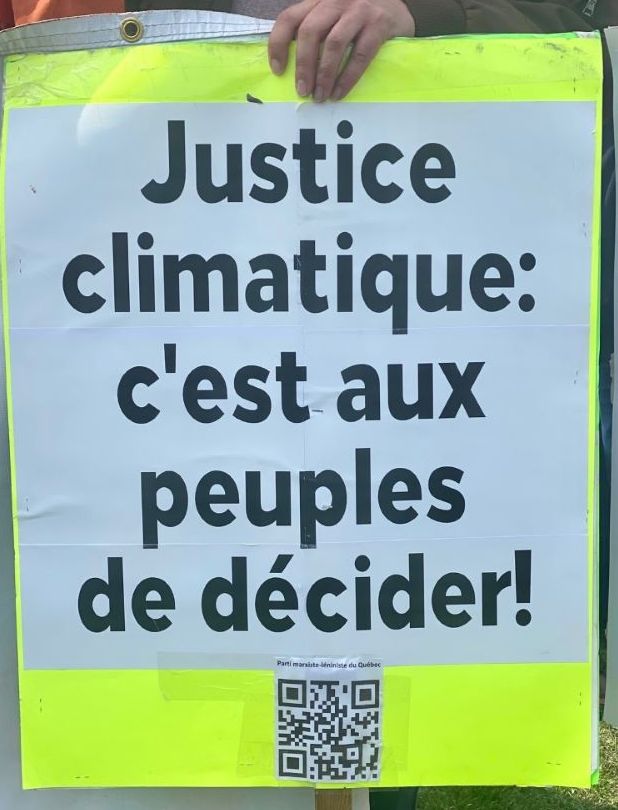 On Saturday, April 22 in
Montreal, more than 7,000 people of all ages and backgrounds
demonstrated in the streets of Montreal under the banner: Social
justice, climate justice: same fight. The coalition of 170
organizations, which initiated the events, is calling for a
"fossil fuel exit" and a "massive reinvestment in the social
safety net". Student groups, unions, community advocacy
organizations, political parties and families marched together
to demand this social and climate justice for the planet and
humanity.
On Saturday, April 22 in
Montreal, more than 7,000 people of all ages and backgrounds
demonstrated in the streets of Montreal under the banner: Social
justice, climate justice: same fight. The coalition of 170
organizations, which initiated the events, is calling for a
"fossil fuel exit" and a "massive reinvestment in the social
safety net". Student groups, unions, community advocacy
organizations, political parties and families marched together
to demand this social and climate justice for the planet and
humanity.
Organizers, including student representatives, spoke of the
inseparable link between the natural and social environment,
calling for the reopening of Roxham Road, an end to attacks on
migrants and refugees, opposition to attacks on Indigenous
Peoples defending their lands, and to the diktat of monopolies
that plunder, pollute, and destroy for maximum profit at any
cost, against the will of the people. The war and the Pentagon
were also denounced as the biggest polluters and destroyers of
the planet. Demonstrations also took place in Quebec in
Joliette, Trois-Rivières, Chicoutimi, Sherbrooke, Rouyn Noranda,
Rimouski, Outaouais, Baie-Comeau. In Quebec City, nearly 10,000
people marched, which would make it, according to the
organizers, the largest demonstration since 2019.
Quebec
Montreal
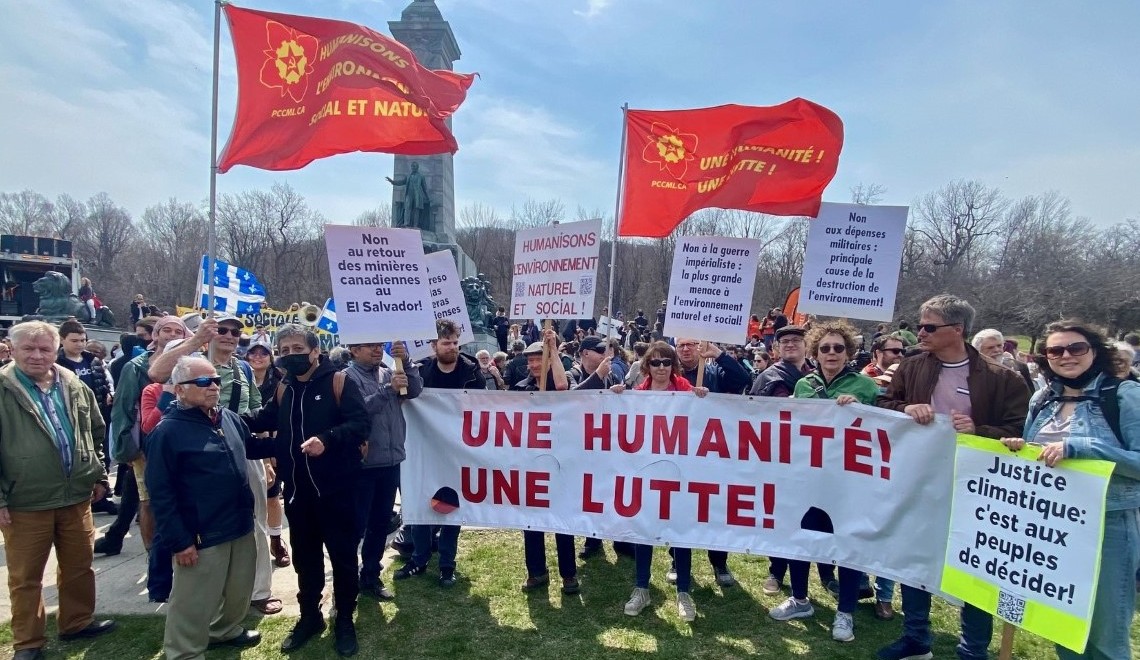
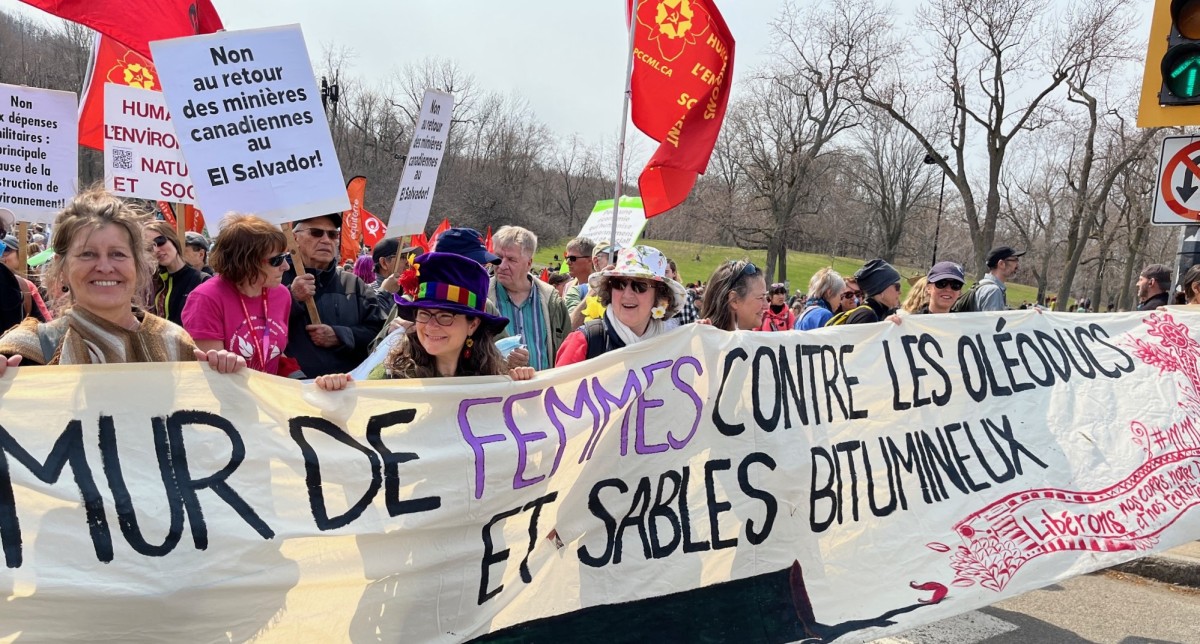
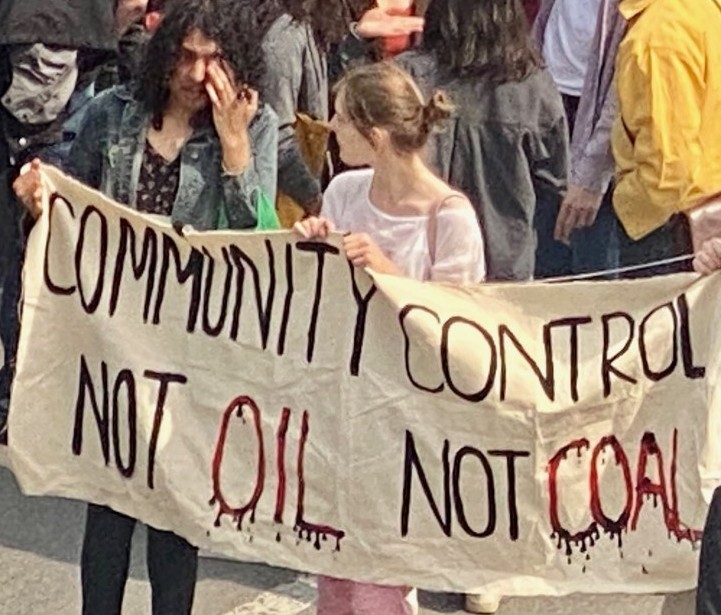
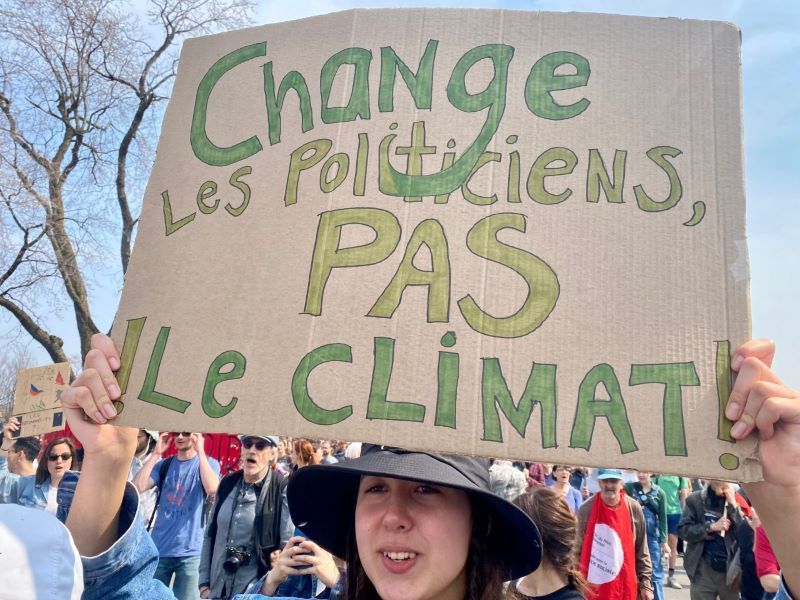

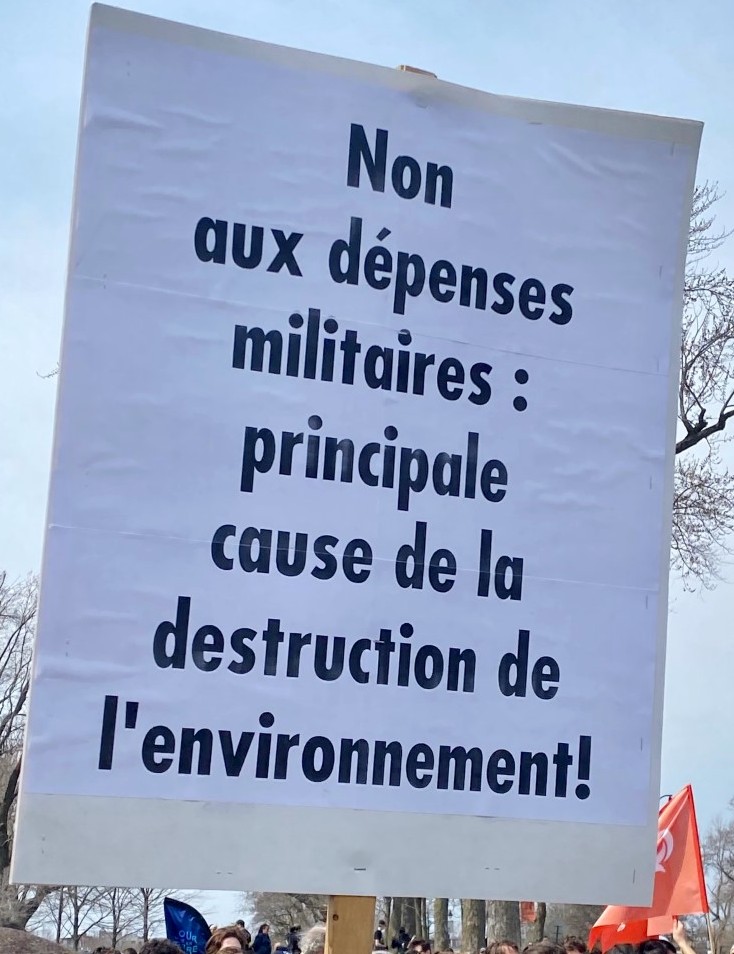
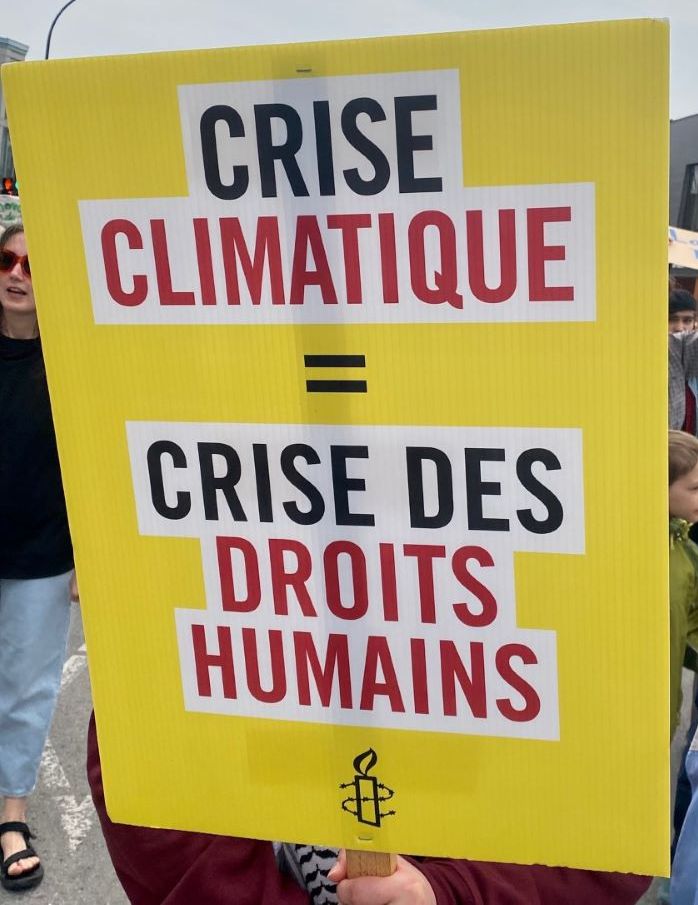
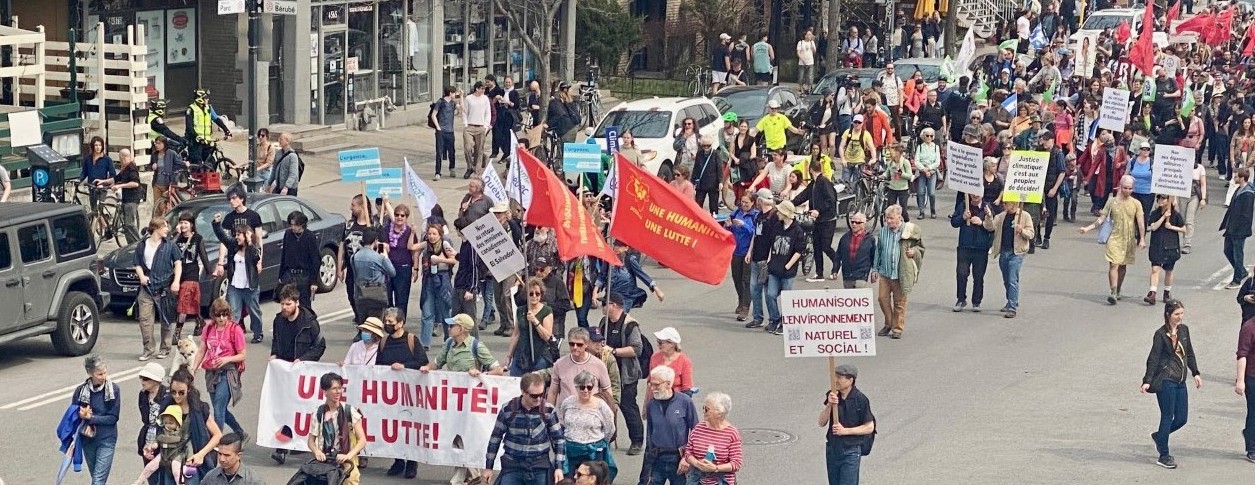
Rouyn
Baie Comeau
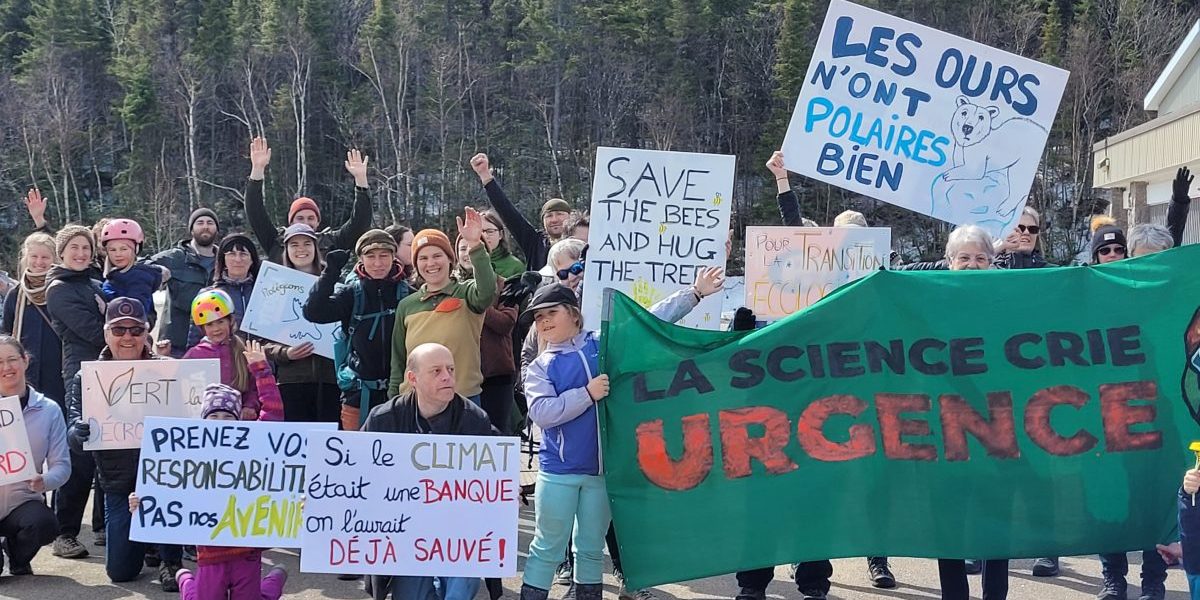

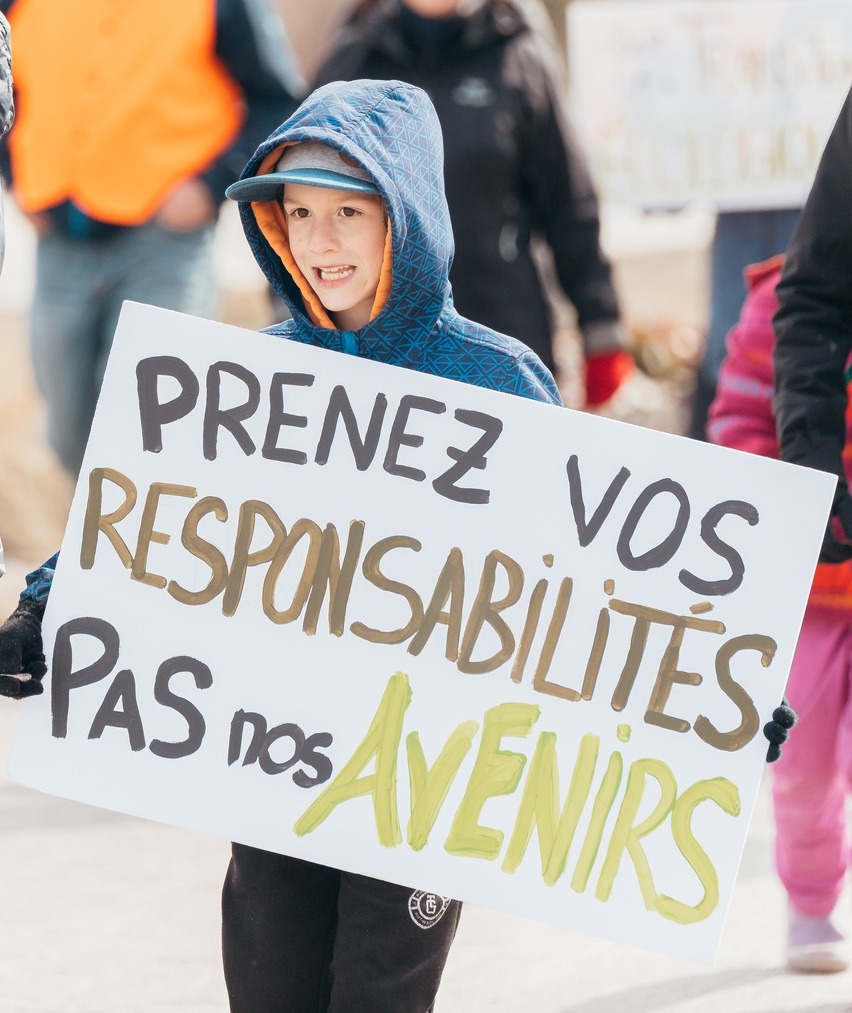
Militant Support for Palestinian People's Right to Be
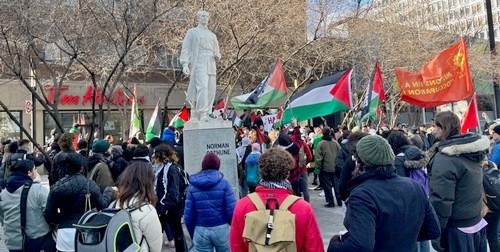
Montreal rally, April 7, 3023
Actions took place in a number of cities across Canada April 7-15 to support the Palestinian people's right to be and express the people's anger and outrage at the state of Israel's latest provocations against the Palestinian people and their brutal assault by Zionist forces on the Al-Aqsa mosque, in occupied East Jerusalem.
In Montreal several hundred people held gatherings and marched through downtown. Youth from Solidarity for Palestinian Human Rights called the first rally at Norman Bethune Square on April 7, which was followed by a lively march through the streets of downtown Montreal to the Israeli consulate. For nearly two hours the crowd – the majority of whom were youth – chanted slogans such as Palestine Will Live, Palestine Will Win!, Israel Criminal, Canada Accomplice!, From the River to the Sea, Palestine will be Free!, End the Occupation Now!, Viva Palestina, Viva Gaza!, and Palestine in Our Hearts, Free Our Brothers and Sisters!
The following day, in response to the call of the Muslim Community Centre of Montreal and the Canadian Palestinians Conference, a two-hour rally took place at Dorchester Square. Under a sea of Palestinian flags, more than a hundred people, mostly families, chanted slogans in support of the Palestinian people's struggle for their right to be.
Montreal
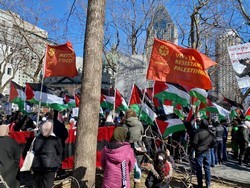
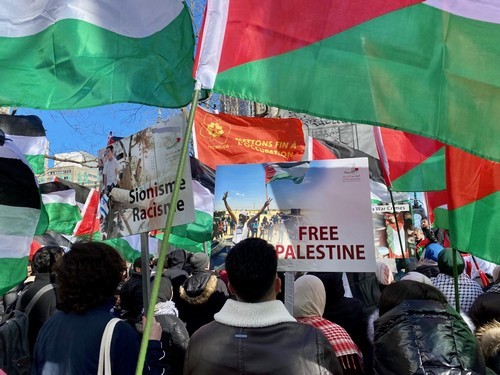
Toronto

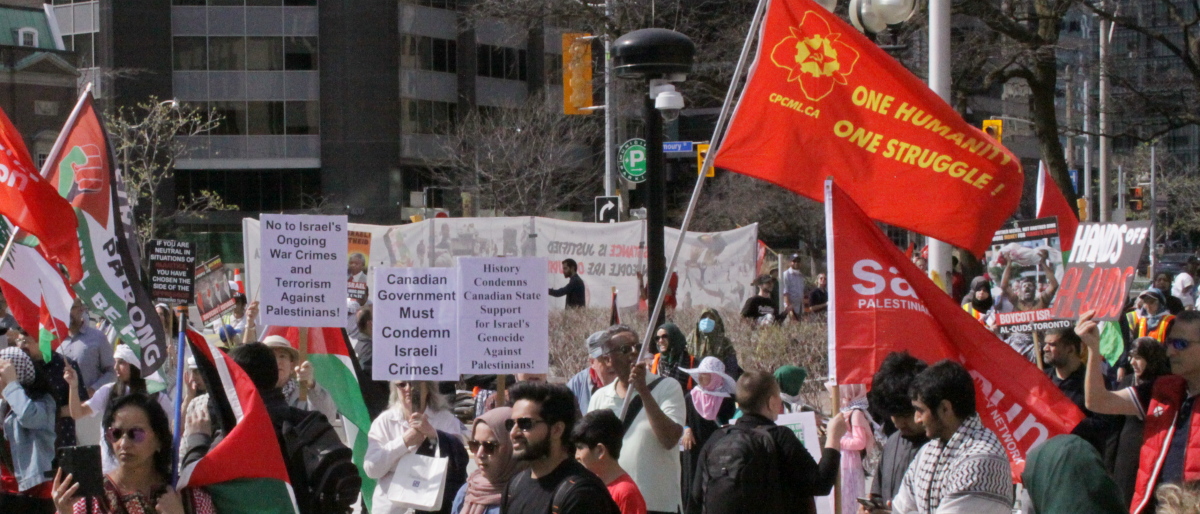
Windsor
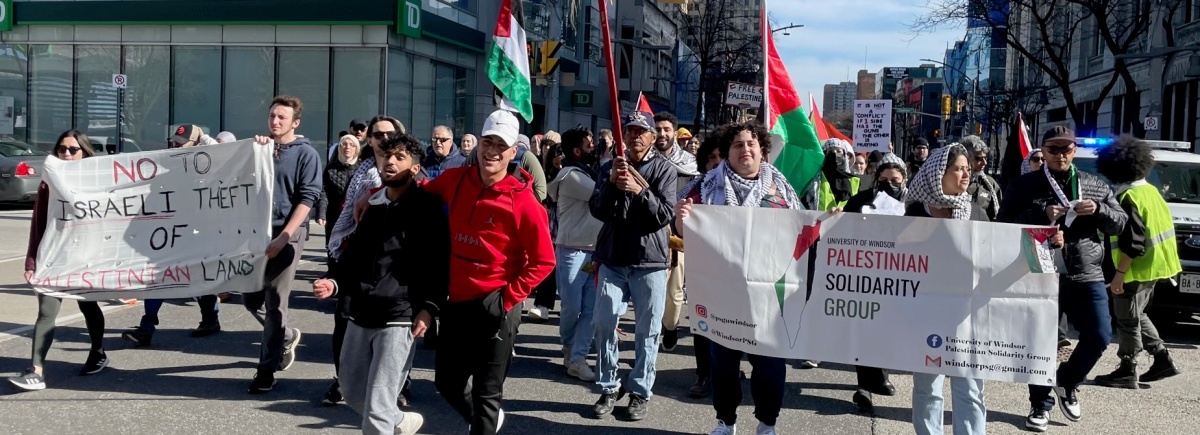
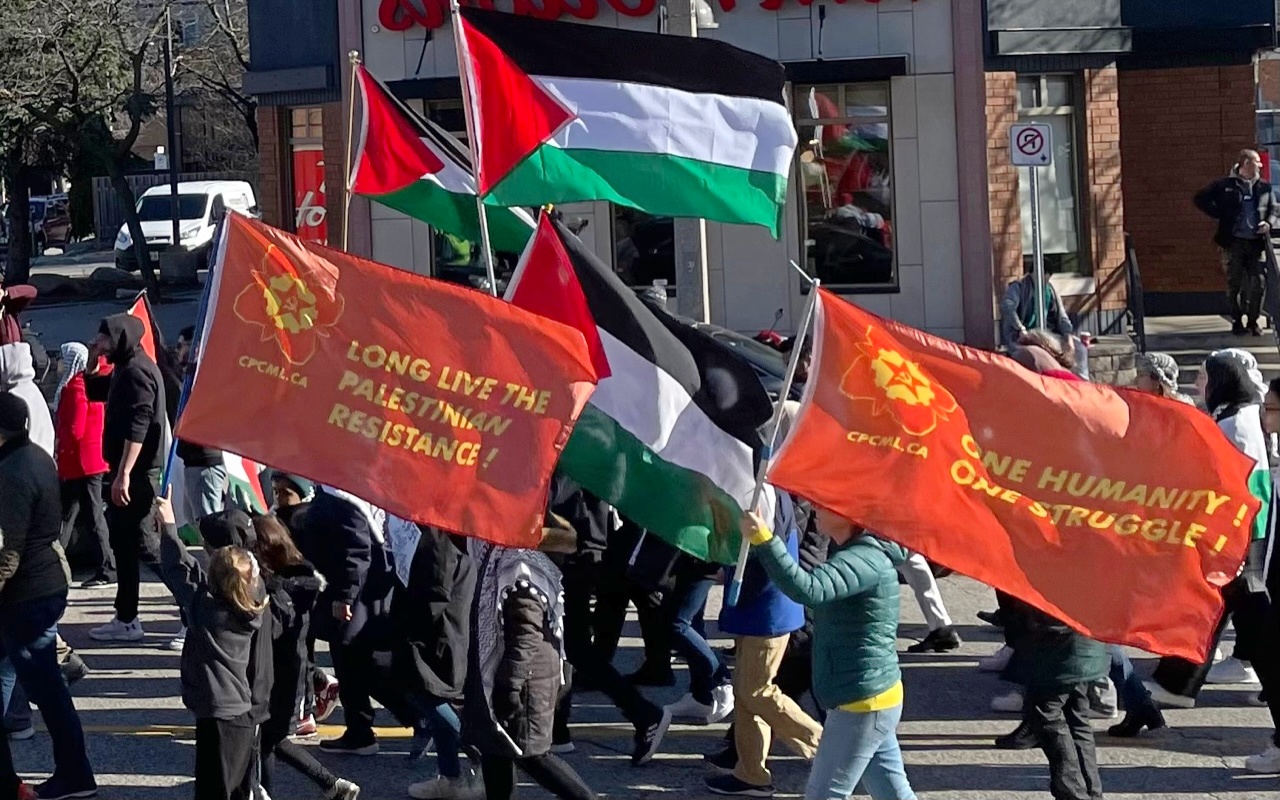
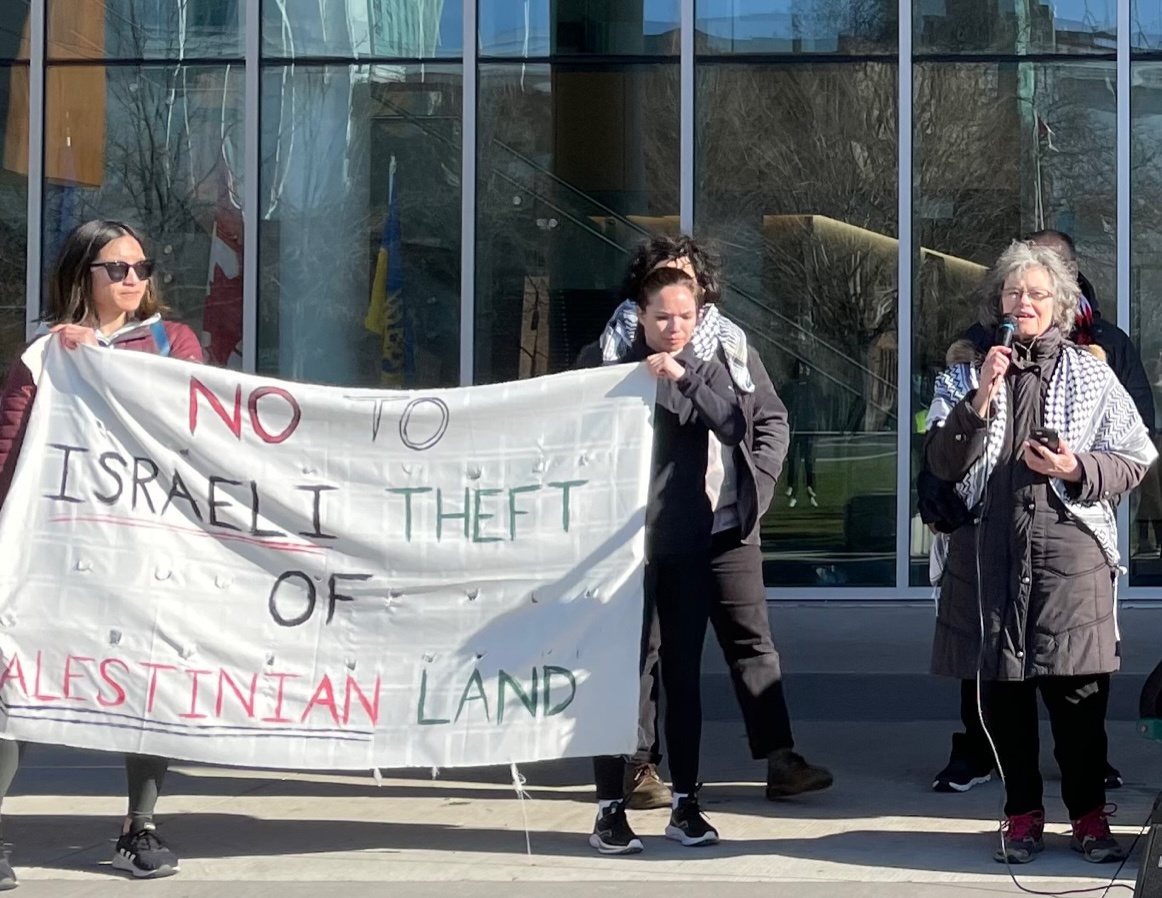
Calgary
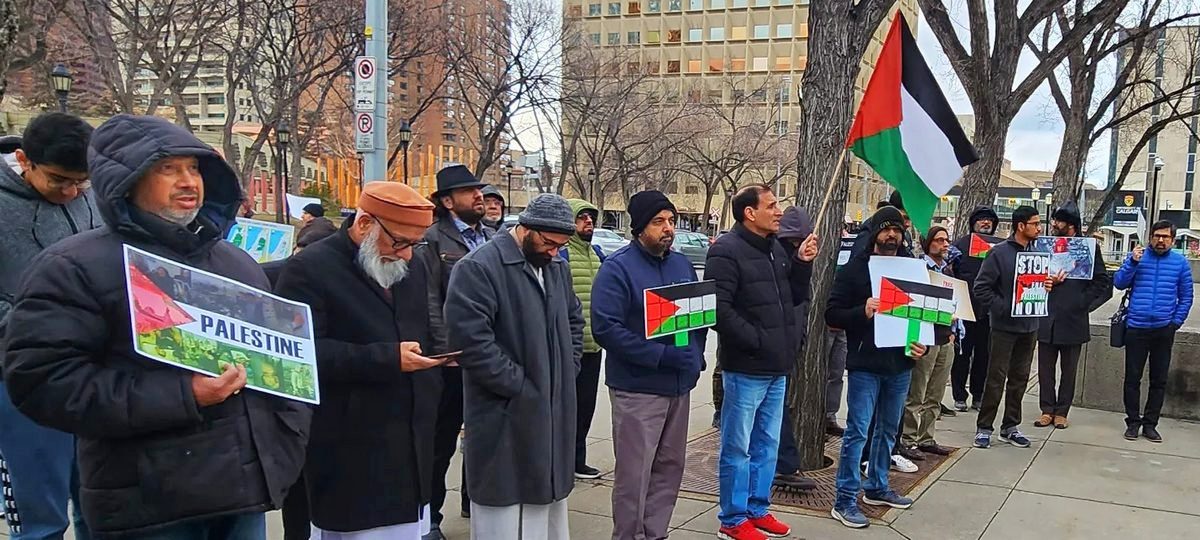
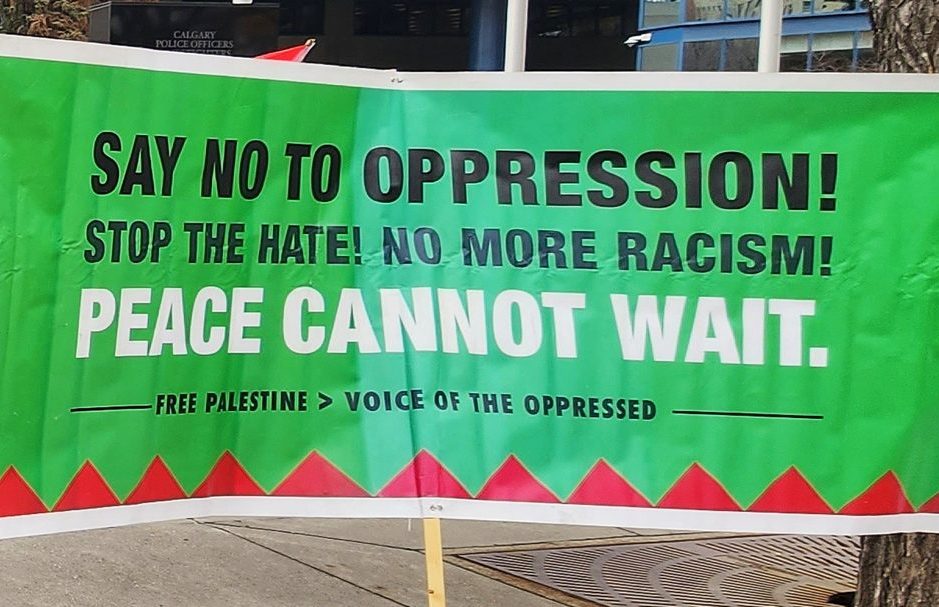
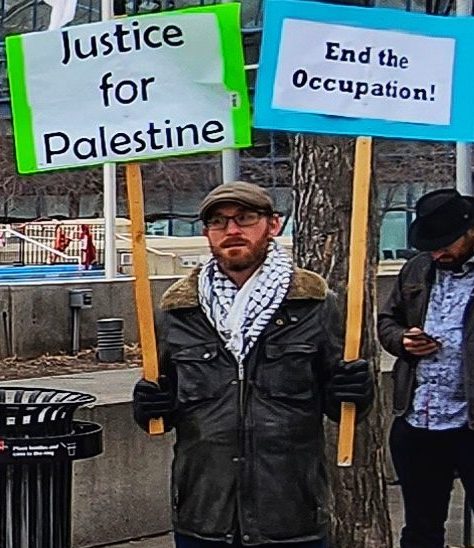
Vancouver
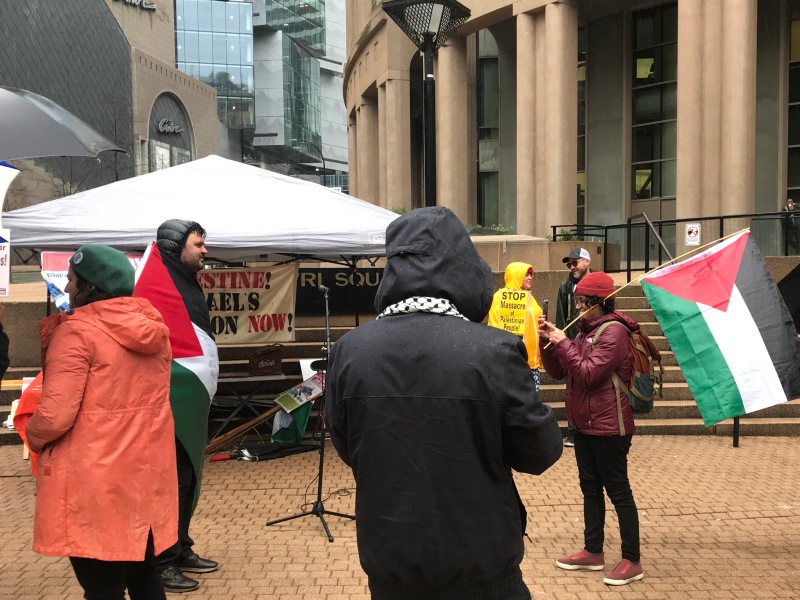

Responses to Alarming U.S. Deployments in Asia Pacific
U.S. Deploys Nuclear Weapons
on
Korean Peninsula
U.S. President Joe Biden and the president of the Republic of Korea (ROK) Yoon Suk-yeol agreed to deploy U.S. nuclear missiles to the ROK. Biden blames the Democratic People's Republic of Korea (DPRK) for the measure which violates the Korean Armistice Agreement signed by the U.S. in 1953 and is a clear threat to the DPRK.
"Look, a nuclear attack by North Korea against the United States or its allies ... or partners is unacceptable and will result in the end of whatever regime to take such an action," Biden said. The U..S already has approximately 28,500 U.S. troops based in the ROK and has military command of the south Korean armed forces "during any crisis or emergency." In fact, the U.S. commands those armed forces at all times and it is the Koreans who are forced to pay for the costs incurred on all the U.S. military bases in that country.
The publicly announced deployment of U.S. nuclear weapons to south Korea ratchets up the U.S. threat against peace and stability not only against the DPRK, the people of the ROK and the entire Korean Peninsula, but against China and Russia as well. The use of nuclear weapons as an instrument of "negotiations" is a measure used by the U.S. imperialists since they dropped atomic bombs in Hiroshima and Nagasaki and then considered dropping them in Korea during the Korean War to wipe out both the DPRK and China, and also in the Vietnam War. In today's conditions where the U.S. is running roughshod all over every country in the world, including its "allies" and making one announcement after the other of what it expects them to do, the people of the world are served notice that they must get prepared for the dangers which lie ahead.
Chinese President Xi Jinping said on April 26 that no one wins a nuclear war. While talking to his Ukrainian counterpart Volodymyr Zelensky on the telephone, he said dialogue and negotiations are the only viable way out for the Ukraine crisis. Reports inform that the two sides exchanged views on China-Ukraine relations and the Ukraine crisis. China will send a special representative of the Chinese government on Eurasian affairs to visit Ukraine and other countries to conduct in-depth communication with all parties on the political settlement of the crisis, President Xi said.
Thus far Ukraine has set reclaiming its lost territory as a precondition for any talks with Russia which is a non-starter for Russia which maintains its demands for conditions which safeguard its security.
Elsewhere in Asia, the U.S. is planning to construct four more military bases in the Philippines, under the Enhanced Defense Cooperation Agreement (EDCA), as part of its war preparations against China.
Reports indicate that the U.S. will construct facilities to launch long-range missiles in one or more of these EDCA locations. Since 2021, the U.S. Indo-Pacific Command has been planning to construct a network of ground-based missile launching systems along what it calls the "First Island Chain" which includes Japan, Korea, the Philippines, and other islands closest to China. The Communist Party of the Philippines issued a statement condemning the Ferdinand Marcos Jr. regime for colluding with the United States in its plan to construct the bases.
In a related development, the U.S. has announced that this year's Balikatan military exercise held jointly with the Philippines will be the largest ever held with more than 17,600 troops participating. The International League of Peoples' Struggle has denounced the exercises and all actions which trample on the country's national dignity and independence.
Democratic People's Republic of Korea Successfully Tests Ballistic Missile
On April 13 Democratic People's Republic of Korea (DPRK) tested a new solid fuel intercontinental ballistic missile (ICBM) which it says will greatly enhance its defence capabilities as solid fuel missiles are much more difficult to detect and easier to ready for firing. An ICBM is a ballistic missile with a range greater than 5,500 kilometres. Most modern designs allow a single missile to carry several warheads, each of which can strike a different target. Only Russia, the United States, China, France, India, the United Kingdom, Israel and the DPRK are known to have operational ICBMs.
"The development of the new-type ICBM Hwasong-18 will extensively reform [the DPRK's] strategic deterrence components [...], radically promote the effectiveness of its nuclear counterattack posture and bring about a change in the practicality of its offensive military strategy," the leader of the DPRK Kim Jong Un said.
Meanwhile, in addition to the DPRK, both Russia and China hold the U.S. and its allies responsible for the escalation of tensions in the region. Referring to a meeting of the UN Security Council held on April 17, Russian Deputy Foreign Minister Andrey Rudenko and Special Representative of the Chinese Government on Korean Peninsula Affairs Liu Xiaoming said in a joint statement: "The current situation around the Korean Peninsula was discussed in detail. The sides agreed that the responsibility for the current aggravation lies with Washington and its allies, which, contrary to their own commitments, refuse to engage in dialogue with north Korea on security guarantees and take practical confidence-building measures. On the contrary, they increase large-scale military exercises in the region, which are provocative in nature."
National Democratic Front of the Philippines Celebrates 50th Anniversary
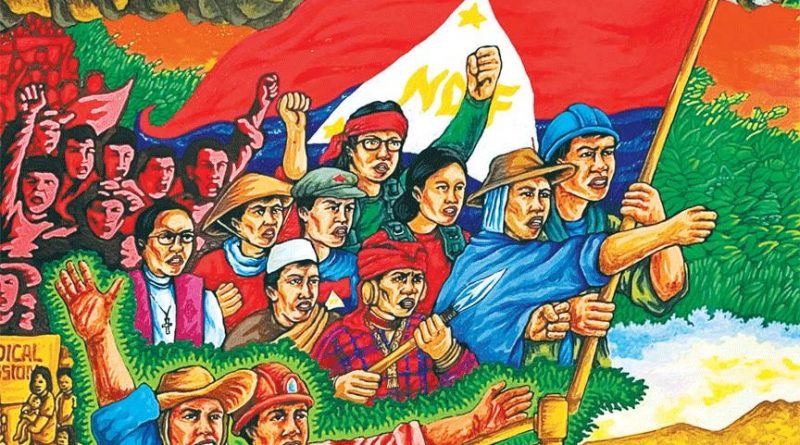
The National Democratic Front of the Philippines (NDFP), the broad united front of 18 allied organizations under the leadership of the Communist Party of the Philippines (CPP) marked its 50th anniversary with two days of celebrations in Utrecht, the Netherlands on April 22-23.
It was 50 years ago under the Marcos dictatorship and martial law that the NDFP was founded, when the basic alliance of workers and peasants together with other democratic and progressive forces saw the necessity of forming a national united front to fight the U.S.-backed dictatorship. On the initiative of Jose Maria Sison, the late founder and leader of the CPP and its armed wing the New People's Army (NPA), the NDFP was founded on April 24, 1973 with the aim "to arouse, organize and mobilize the broad masses of the Filipino people in their millions to advance the revolution and attain victory." Comrade Sison remained the Chief Political Consultant to the NDFP until his death in December 2022.
Summing up the achievements of the last 50 years, the NDFP notes: "The Filipino people's courage and perseverance in waging a just struggle through their national democratic revolution, as manifested in protracted people's war, have gained victories and made great advances. The Filipino people continue to deal heavy blows to the enemy while at the same time building a new system that will bring genuine development and the desired lasting peace because there is justice. Today the revolutionary forces are in 70 of 81 provinces in the Philippines and function in 110 guerrilla fronts providing land reform, health, education, justice, defence, economic and other basic services to millions of people."
The NDFP has also been engaged in peace negotiations with successive Philippine governments since the defeat of the Ferdinand Marcos dictatorship in 1987. The negotiations are aimed at securing a just peace to end the more than 50-year civil war pitting the Filipino people organized by the CPP, NPA and NDFP against successive U.S.-backed puppet governments. More than 10 important agreements have been concluded, including the Hague Joint Declaration of 1992 which sets forth the need and mechanisms for addressing the roots of the armed conflict through basic economic, social and political reforms and which also laid out a framework for further negotiations; the Joint Agreement on Safety and Immunity Guarantees (JASIG); the Comprehensive Agreement on Respect for Human Rights and International Humanitarian Law (CARHRIHL) and even an Interim Peace Agreement between the government of the Philippines and the NDFP in 2018.
However, at every turn the Philippine government under the dictate of U.S. imperialism has sabotaged these agreements. The previous Rodrigo Duterte regime (2016-2022) was especially notorious, refusing to uphold safety and security guarantees for NDFP personnel, in fact assassinating some of its staff in the Philippines and targeting the NDFP as a terrorist organization under the Anti-Terrorism Act of 2020. The Duterte regime also sabotaged the negotiations to achieve an agreement on the Comprehensive Agreement on Social and Economic Reforms (CASER), a broad nation-building framework advanced by the CPP and the NDFP.
Despite the desperate, violent and brutal attempts by successive U.S.-sponsored puppet governments including the current regime of Ferdinand Marcos Jr. to quell the revolutionary movement of the Filipino people through the anti-communist targeting of the CPP, NPA and NDFP as terrorist organizations, the revolutionary and democratic forces in the Philippines prevail and are becoming stronger and more determined. They continue to face the U.S.-supported Philippine state in every arena of battle and stand firm in their aspiration to realize the ultimate political goal of establishing a democratic people's republic in their own image.
On this occasion, the Communist Party of Canada (Marxist-Leninist) sent its heartfelt congratulations to the leadership of the NDFP and all its militants across the country and abroad whose sacrifice and struggle hold the promise of a life in the Philippines without the hardships imposed by the subservience of successive governments to the U.S. imperialists. The achievements of the NDFP are many, seen in the conditions of life in the areas where the people rule themselves, feed themselves, educate themselves and learn how to wage effective struggle to liberate the Philippines.
CPC(M-L) calls on the Canadian people to step up support for the fighting people of the Philippines who are making their contribution to a world free from U.S. imperialism, for peace and for the independence and self-determination of all nations and peoples.
A Red Salute to the National Democratic Front
of the Philippines on its
50th Anniversary!
Long live the immortal deeds of the heroes and
martyrs of the Filipino people!
Strengthen the Bonds of Friendship and
Solidarity Between the
People of Canada and the Philippines!
(To access articles individually click on the black headline.)
Website: www.cpcml.ca Email: editor@cpcml.ca


 Patrick Poitras
Patrick Poitras